Употребление Either, Neither и Both
Обычно они являются бинарно связанными друг с другом; другими словами, «both», «either» и «neither» используются, для связи или соединения двух сущностей (люди, объекты, абстракции) утвердительно, либо отрицательно.
Проблема в том, что «both», «either» и «neither», а особенно «both», имеют разные функции. В зависимости от контекста, их можно рассматривать как квантификаторы (указатели множества), прилагательные, местоимения, союзы или наречия.
Использование их в предложениях на самом деле довольно простое, но прежде чем перейдем на личности, давайте запомним самое важное:
- они используются только по отношению к двум объектам, только к паре;
- «both» и «neither» имеют прямо противоположное значение: «оба» и «ни один», а «either» используется, когда нужно сделать выбор в пользу одного или другого;
- «neither» не употребляется в отрицательных предложениях. В английском предложении не может стоять сразу два отрицания (отрицательный глагол и местоимение «neither»).
А теперь поподробнее.
Придаточное – подлежащее
Как и следовало ожидать, такое предложение будет отвечать на вопрос who? what? Присоединяется к главному оно с помощью самых разнообразных союзов: that, if, whether, who, whom, whose, what, which, when, where, how, why:
- Whether they are coming today is not certain.
- Why he made this decision is difficult to understand.
- How the accident happened is a total mystery.
Как видно из примеров, в основном это предложения, в которых говорящий задается каким-либо вопросом и затем высказывает свое отношение к нему. Кроме того, мы можем заметить, что такое громоздкое подлежащее нетипично для английского языка. Поэтому достаточно часто в роли формального подлежащего выступает местоимение it, а настоящее подлежащее, выраженное придаточным предложением, переносится в конец высказывания:
- It is not certain whether they are coming today.
- It is difficult to understand why he made this decision.
- It is a total mystery how the accident happened.
All, everybody, everything, everyone
All (все, весь, вся, всё) — это обобщающее местоимение (defining pronoun), оно указывает на всю группу предметов или людей в целом.
Примеры использования: All the doors are closed. — Все двери закрыты. He loved me, that’s all. — Он любил меня, вот и всё.
Everybody/everyone (каждый, всякий, все) указывает на каждого члена группы людей одного за другим.
Everything может указывать на предметы (не людей) в том же значении.
Обратите внимание, что everybody, everyone, everything в английском языке используются с глаголами в форме единственного числа. Примеры:Everybody (everyone) reads this book
Alice knows everyone in her street. Yana thinks that she knows everything. Michael protects everybody.
Примеры:Everybody (everyone) reads this book. Alice knows everyone in her street. Yana thinks that she knows everything. Michael protects everybody.
С используется all:
Tom spends all hist free time in the gym.
The Corleones have got all the information they want.
В выражении all about используется all:John told us all about the company.
Мы можем использовать all day/the whole day (morning, everning, night, week), когда имеем в виду полный день:all day (not “all the day”)all week (not all the week)all morning, the whole morning
Местоимение all часто используется после местоимений we, you, they и глагола to be:We all know her. — Мы все её знаем.
We are all like her. — Она нравится нам всем.They all went there. — Они все пошли туда.
They are all at her home. — Они все у неё дома.
Запомните расположение местоимения all в следующих конструкциях:We have all read the book.
We shall all be at home tonight.
We must all complete the fate.
Также запомните следующие выражения:we all = all of us they all = all of them you all = all of you You must all watch the film. = All of you must watch the film They all live here. = All of them live here Мы все трое — All three of us. Они все пятеро — All five of them.
Фраза «всё, что» переводится на английский язык как all (that), либо everything (that):That’s all she wants. Sean told him everything he knew.
Обратите внимание, что после местоимений every, everyone, everybody, everything используется форма глагола, соответствующая форме единственного числа (хотя это и выглядит странно для русского человека):Every seat in the theatre was wet.Everybody looks pitty today.Everything Catherine said was true. Когда говорится о частоте какого-либо действия или события используется every:We go out every Saturday
Catherine asks me out every day. Ann goes to see her mother every three weeks
Когда говорится о частоте какого-либо действия или события используется every:We go out every Saturday. Catherine asks me out every day. Ann goes to see her mother every three weeks.
Употребление местоимения all
1. Местоимение all – все, всё, вся, весь, часто употребляется как прилагательное с существительными и личными местоимениями. Самостоятельно местоимение all используется только в том случае, если за ним следует определительное придаточное предложение, в других случаях оно заменяется на местоимения everybody/everything/everyone.
Примеры:He’s forgotten all that I told him. – Он забыл все, что я говорила ему.
He’s forgotten everything. – Он забыл все.
2. Перед существительными без артикля и притяжательными или указательными местоимениями all употребляется в качестве местоимения-прилагательного.
Примеры:all iPhones – все айфоны;
The minister has answered all questions. – Министр ответил на все вопросы.
3. Перед существительными с артиклем или притяжательным или указательным местоимением all употребляется в качестве местоимения-прилагательного или с предлогом of.
Примеры:all (of) the iPhones – все айфоны;all (of) her dresses – все ее платья;
4. Местоимение all может часто стоять после местоимений в объектном падеже – us/you/them.
Примеры:She invited us all. – Она пригласила нас всех.
I’ve answered to them all. – Я ответил им всем.
Сочетания we all, us all = all of us, сочетание you all = all of you, и they all, them all = all of them.
Примеры:I’ve answered to them all. – Я ответил им всем. = I’ve answered to all of them.
5. Местоимение all употребляется перед исчисляемыми существительными во множественном числе и неисчисляемыми существительными. С исчисляемыми существительными в единственном числе часто употребляется whole – весь, целый, полный.
Примеры:all her salary – вся ее зарплата;all the water – вся вода;
The whole house was kindled into a flame. – Весь дом пылал в огне.
6. All употребляется с некоторыми исчисляемыми существительными в единственном числе – day, morning, week, year. Также вместо местоимения all в данном случае можно употреблять the whole.
Neither и either
За neither/either следует существительное в единственном числе.
Neither task is urgent. Ни одна задача не срочная.
Neither student has answered correctly. Ни один студент не ответил правильно.
Either way is dangerous. Любой путь опасен.
Как и в случае с both, мы можем опускать существительное после neither/either.
What do you like more: broccoli or cauliflower? Neither. Что ты больше любишь: брокколи или цветную капусту? Ни то, ни другое.
Would you like green tea or black tea? Either. I don’t care. Ты будешь зелёный чай или чёрный? Любой. Мне всё равно.
Мы можем употреблять neither и either с предлогом of: neither/either of + the/these/my/Tom’s/them. В отличие от both, предлог of всегда обязателен.
Neither of these bags is heavy. Ни одна сумка не тяжёлая.
Neither of them wants to make a decision. Никто из них не хочет принимать решение.
Neither of Lila’s brothers lives in Canada. Ни один из братьев Лилы не живёт в Канаде.
I haven’t met either of those men. Я не встречал ни одного из этих мужчин.
You can talk to either of us. Ты можешь поговорить с любым из нас.
Важно отметить, что neither уже заключает в себе отрицание, поэтому глагол ставится в утвердительную форму. Если же мы употребляем глагол в отрицательной форме, то с ним идёт either
Сравните с no и any:
There are two green apples. Есть два зелёных яблока.
There are no red apples. Neither of the apples is red. Красных яблок нет. Ни одно яблоко не красное.
There aren’t any red apples. I didn’t taste either of the apples. Красных яблок нет. Я не пробовал ни одно из яблок. НЕВЕРНО neither of the apples
Также мы можем говорить neither … nor … — ни …, ни …, either … or … — либо …, либо …
Neither Kelly nor Mike came to the party yesterday. Ни Келли, ни Майк не пришли вчера на вечеринку.
I’m neither thirsty nor hungry. Я не хочу ни пить, ни есть.
He neither skis nor ice-skates. Он не катается ни на лыжах, ни на коньках.
You can contact either Mr Trevis or Mrs Davidson. Ты можешь связаться либо с мистером Тревисом, либо с миссис Дэвидсон.
All the bananas were either green or overripe. Все бананы были либо зелёными, либо переспелыми.
I’ll either leave later today or arrive earlier tomorrow. Я либо уйду сегодня позже, либо приду завтра пораньше.
Союзы Either… or, Neither… nor, Both… and …
Союзы either… or, neither… nor, both… and … используются, когда речь идет о двух противопоставляемых понятиях. Разберем их на примере с предложением:
1. Either… or – “или… или”
Союз either… or значит «или… или», «либо… либо» и подразумевает присутствие либо одного действия, либо другого, но не обоих сразу. Как и его аналог в русском языке, он ставится не между двумя словами, а одна часть перед одним словом, другая перед другим.
2. Neither… nor – “ни…, ни”
Союз neither… nor значит «ни…, ни…», подразумевает отрицание обоих действий.
Обратите внимание: в предложении с neither… nor глагол can стоит в утвердительной форме. Союз neither… nor сам несет отрицательное значение, поэтому глагол can ставить в отрицательную форму не нужно
3. Both… and … – “как…, так и …”
Союз both… and… значит «как…, так и …», «и… и…», подразумевает наличие обоих понятий.
Эти союзы могут использоваться не только с глаголами, но и с другими частями речи.
Number of Elements When Using Either or Neither
 Whether you are using either or neither, you can only frame two alternatives/elements.
Whether you are using either or neither, you can only frame two alternatives/elements.
- Either this or that.
- Neither this nor that.
It is possible to find examples in print or on the web where these words are comparing many alternatives, but this should be avoided whenever possible.
- I had neither considered your offer, the location, nor the position yet.
- We can make either hotdogs, hamburgers, or BBQ. Your pick.
It’s best to omit neither or either in sentences like those above.
- I had not considered your offer, the location, or the position yet.
- We can make hotdogs, hamburgers, or BBQ. Your pick.
Either…or
4. Про everything, everybody и everyone Вы можете прочитать в упомянутой выше статье. Лишь напомню Вам о том, какую типичную ошибку с ними не стоит совершать. Они имеют значение единственного числа, соответственно и глаголы должны стоять в нем же, несмотря на то, что в русском языке Вы бы сказали по-другому.
Everybody is happy that Steve came (Каждый был рад тому, что Стив пришёл).Everything they talked about was very interesting (Всё, о чем они говорили, было очень интересно).
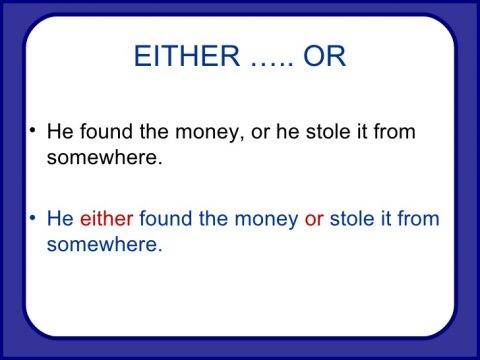
И, конечно, блог Viva Европа Вам тоже в этом поможет, следите за новыми статьями и повышайте уровень каждый день.С Вами была я, филолог английского языка, Екатерина Мартынова.
Желаю Вам хорошего дня!
Either
Транскрипция/перевод: (американский вариант), (британский вариант) / «либо тот, либо другой», «любой из двух».Значение: является местоимением, определителем, союзом или наречием, и сопровождается утвердительным глаголом в единственном числе. В отрицательных предложениях означает «ни тот, ни другой» или «ни один из двух», в утвердительных — «либо тот, либо другой». Еще в современном английском есть значение «и тот и другой». Употребление: в основном используется в вопросах или отрицательных предложениях вместо «also» или «too». Используется как союз для выражения альтернатив и/или выбора между двумя (а иногда и более) вещами. Используется с глаголом в единственном числе (иногда используют и во множественном числе, хотя это и грамматически неверно).
Первый итог: в чем же разница между «either» и «both»?
Both — и то и другое одновременно, сразу. Возможны оба варианта (могу выпить и кофе и шоколад сразу).Either — тоже возможны оба варианта, но только в разное время (он может быть и американцем и канадцем вообще, но он может быть только одним из них на самом деле в этот момент).
Упражнение
Ответы — под видео. But try your best first!
1. I don’t support any football team.Me neither / Me too / Neither did I
2. I didn’t take it.Neither did I / Neither didn’t I / Neither do I
3. Neither of these _______ Italian.restaurants is / restaurant is / restaurants are
4. Both of my _______ very kind.friend is / friends is / friends are
5. You can take _______ a bus or a subway to get there.neither / either / both
6. Neither of them _______ speak French.could not / — / could
7. I like _______ hunting _______ scuba diving.both, or / and, and / both, and
8. They _______ sound great, _______ connected to the record.neither, both / both, both / both, and
9. Where were your kids yesterday? _______ at school.Both are / Both were / Neither
10. Would you like beer or whiskey? _______ I’m a non-drinker.Both / Either / Neither
The answers:
1. Me neither; 2. Neither did I; 3. restaurants is; 4. friends are; 5. either; 6. could (-); 7. both, and; 8. both, both / both, and; 9. Both were; 10. Neither.
Singular/Plural When Using Neither… Nor Constructions
When you have sentences that take the neither… nor construction, the verb that follows should be singular when the alternatives are singular or when the second alternative is singular. For example,
- Neither the engine nor the fuel tank leaks any fluid.
- Neither the fuel lines nor the fuel tank leaks any fluid.
– but –
Neither the fuel tank nor the fuel lines leak any fluid.
In the first example, both alternatives are singular, so a singular verb follows. Similarly, in the second example, the second alternative is singular, so a singular verb follows.
The third example has a plural second alternative, so the verb that follows the construction is plural.
Correct use of both, either and neither
|
Page Index : |
Both
both
-
Examples 1 to 3 Both
can be used as a primary determiner directly
before
a
noun, but not
before a pronoun. -
Examples 4 to 11 Both
or both of
can be used as a secondary determiner
before
another determiner notably before an article or a possessive, or
(in the case of both of)
before
a pronoun. -
Examples 12 to 16. Both
can be used as a secondary determiner placed
after
a noun or a pronoun. In the case of nouns, this structure is only
used with the subject of a sentence; in the case of pronouns, it is
used with subject pronouns and object pronouns. -
Examples 17 to 20 Both
can be used as a pronoun. -
Both…
and
are used as correlating coordinators. See
below.
Examples :
- I support both
teams, but I prefer Manchester United. -
Both
answers are right. -
Both
machines are in good working order_____ - I support both
the teams, but I prefer Manchester United - I support both
of the teams, but I prefer Manchester United -
Both my
parents are still working. -
Both of
my
parents are still working. -
Both
these machines are in good working order. -
Both
of these machines are in good working order. -
Both of
us very much like playing football. (But not:
Both
us…..) - I like these two blouses, and I want to buy both of them
! ______ -
The
teams both played very well -
They
both played very well, but
we both played very badly. - Which one do you like ? I like them
both. - We want to wish you
both good luck - He told us
both to go home at once.______ - My son and daughter are in high school now,
and both
are doing very well. - Which do you like? I like both.
- You can have one of the other, but you can’t
have both. -
I like these cakes; both
are very tasty.(
Remember that we do not
say the
both)
Note: Both of + pronoun.
Both ofpronounALWAYSSo
we can’t
say: Both
of we nor Both
of they
We have to say: Both of
us or Both of them
Even if this is part of the subject of a sencence.
Both
… and as correlating coordinators
bothand
Examples :
-
Both
Peter and
Jim were at Oxford University in the 1990s. -
Both
you and
your father have been very helpful. - I want to see both
the Picasso exhibition and
the Historical Museum.
Either and neither
Used alonenotornoreitherneitherboth
-
Either
and neither
are never
directly followed by an article or a determiner or a pronoun (see ) -
Either
is a singular determiner or pronoun -
Either
is sometimes used as an adverb standing at the end of a clause (example
16 below). -
Neither
is normally used as a singular, but sometimes as a plural (example 6
below).
Neither
has a
negative value, so is is not necessary to put the verb in the negative
as well.
neither…noreither…or
Examples :
- I support either
team, but I prefer Manchester United. - I support neither
of the teams, but I prefer
Manchester United. - I support neither
team, but I prefer Manchester
United. - I don’t support either
of the teams, but I prefer Manchester
United.
but not…..
I support either of teams
nor
I support neither
of
teams -
Either
answer can be justified -
Neither of my parents is still
working / are still working. -
Either
of these machines will do the job. - I don’t want either
of these machines. - I want neither
of these machines. -
Either
of
us will be happy to help you. -
Neither
of them could come to the meeting
but not…..
Neither of them couldn’t come
…. (That
would be a double negative) - They didn’t tell either
of us what they were doing.
but not…..
They didn’t tell neither of us
…. (That
would be a double negative) - My son and daughter are in high school now, but neither
are doing very well. - Which do you like? I don’t like either
- Which do you like? I don’t like either
of them. - He doesn’t drink coffee, but he doesn’t drink tea either.
Footnote»Eitherneitherneverdeterminercorrelating
conjunctionseitherneither
Neither the Queen nor the President was smiling for the
cameras.
Return
to Linguapress home page
Each, every, either, neither, both, half, all as determiners
Each
‘Each‘ is used to refer to members of a group as separate individuals.
We use ‘each‘:
– before countable nouns, usually singular nouns;– in affirmative and interrogative sentences;– with a singular verb.
- Each boy has his own helmet.
- We want to speak to each teacher privately.
We can use ‘each‘ with of and an article. We can also use ‘each’ after an object – direct or indirect.
- Each of them received a gift.
- Would you like to speak to each of the boys?
- I want to give them each a kiss before I go.
Every
We use ‘every‘ almost the same way as we use ‘each‘, and often, they are interchangeable.
But we use ‘every‘:
– to refer to people or things together in a group;– with a singular verb.
- Pass it around so that every student gets one.
- We’d like to hear from every member of the group.
Either/neither
We use ‘either‘ to refer to one or the other of two people, animals, or things.
‘Either‘ is used in affirmative and interrogative sentences.
- Either color will do; I don’t care.
- Would you like either one of these last two desserts?
‘Neither‘ is the opposite of ‘either’. We use ‘neither‘ to mean not one nor the other of two people, animals, or things.
— We use ‘neither’ in negative sentences.
— Sometimes, we use ‘neither’ followed by of, with or without an article. We must always use of when neither comes before a pronoun.
— When we use ‘neither’ with of and another determiner, (my, his, these, the, etc.), we use it before a plural noun.
- Neither of the boys admitted his guilt.
- Neither parent knew where the child had gone.
- Neither of us wants to be here.
— We use ‘neither‘ with a singular verb unless it is followed by of, in which case we can use singular or plural, with the plural verb being less formal.
All/half
Both ‘all‘ and ‘half‘ tell us the quantity of a group. We use ‘all‘ to refer to the whole group or everyone or thing in the group. ‘All‘ means that nothing and/or no one has been left out. We use ‘all‘ with both countable and uncountable nouns in negative, affirmative, and interrogative statements.
- All life is important.
- All students deserve the help they need.
— We can also use ‘all‘ with the definite article the to describe a specific group, as well as with of the. We can use ‘all‘ with other determiners.
- Where are all the children?
- I want to see all of the students in my office now.
- Where are all my toys?
— Both a singular or plural verb can be used with ‘all‘, depending on the noun it is modifying. If it modifies a noun that takes a plural verb, we use the plural and vice versa.
— We use ‘half‘ to refer to a part of a group that is divided into two sections. We also use ‘half‘ to refer to measurements, followed by an indefinite article. We can also use ‘half‘ and the definite article the, as well as other determiners.
- The recipe calls for half a lime.
- Only half of the group wants to go hiking.
Both
We use ‘both‘ to refer to a pair of people or things.
— We can only use ‘both‘ with plural, countable nouns because it refers to two things. We use ‘both’ with a plural verb.
- I had both children in Hawaii.
- Both flights have been delayed.
— ‘Both‘ can be used with of, with or without an article. However, when ‘both‘ is followed by a plural pronoun, we must use of after both.
- Both of us want kids.
- Both of the children were born there.
Both
Транскрипция/перевод: / «оба», «и этот, и тот», «и тот, и другой».Значение: определитель (предетерминатив), местоимение. Обычно объединяет двоих единой правдой. Фраза both «A» and «B» означает «как А, так и В».Употребление: может быть использовано в качестве местоимения для обозначения двух вещей (или людей), которые уже были упомянуты.
При использовании «both» с объектным местоимением (me, you, him, her, it, us them), нам нужен предлог «of» перед этим местоимением.
Можно использовать «both» после объектного местоимения.
«Both» идет после «to be» (или вспомогательных глаголов, вроде «have», а также после модальных глаголов).
Each и Every
Может относиться к небольшим группам предметов/лиц.
| Each | Every |
| Может относиться к небольшим группам предметов/лиц.
Each of my eyes can see well (Каждый мой глаз видит хорошо). |
Относится к группе из трёх или более существительных, не употребляется, когда их существует два в природе.
Every car at the car park is black (Каждая машина на парковке черная). Every of my eyes can see well |
| Не употребляется с almost/nearly (почти). | Используется с ними.
I drink coffee almost every day (Я пью кофе почти каждый день). |
| Существительное, следующее за ним всегда исчисляемое и стоит в единственном числе.
I liked each country I’ve been too (Мне понравилась каждая страна, в которой я был). |
Существительное, следующее за ним стоит в единственном числе:
Every guest is wearing smart clothes (Каждый гость одет в нарядную одежду). Существительное может стоять в единственном числе, но перед ним обязательно должно быть число. Sam goes to the swimming pool every three days (Сэм ходит в бассейн каждые три недели). |
| Может использоваться как самостоятельное местоимение (без объекта после него).
Staff worked very well this month, so each received a bonus (Работники работали очень хорошо в этом месяце, поэтому каждый получил премию). |
Не выполняет подобной функции. |
No — нет
No употребляется перед существительными как в единственном, так и во множественном числе. При его наличии глагол должен употребляться в утвердительной форме (хотя в разговорном английском все чаще и чаще можно услышать обратное – I ain’t going nowhere with you!).
Как определение no имеет значение «ни один, никакой». Как местоимение no не используется. Вместо него необходимы:
neither – 2 или 1 из 2-х предметов
none – 3 и более предметов
Отрицательные местоимения можно заменить синонимами:
Nobody = not anybody
No one = not anyone
Nothing = not anything
Важно!!! Никто из нас = none of us (NOT nobody of us or no one of us.)
Употребление конструкции neither nor в английском языке

Конструкция neither…nor… переводится на русский язык как «ни…ни…».
Мы пользуемся этой конструкцией, когда нам не подходит ни один из предложенных вариантов.
Обратите внимание: конструкция neither…nor… является сама по себе отрицательной. В английском языке не может быть два отрицания в предложении, поэтому не нужно использовать дополнительно отрицательную частицу not с вспомогательным глаголом
Неправильно
He doesn’t like neither chocolate nor ice-cream.Ему не нравится ни шоколад, ни мороженое.
Правильно
He likes neither chocolate nor ice-cream.Ему не нравится ни шоколад, ни мороженое.
Как произносится neither?
При произношении этого слова также используются два разных варианта: американский и британский. Вы можете выбрать любой из них.
Британское произношение: neither / .Американское произношение: neither / .
Эта конструкция может соединять между собой:
1. Главные действующие лицаНапример: «Ни друзья, ни родственники не поздравили его».
Neither + кто-то + nor + кто-то + действие.
Примеры
Neitherhe nor his friend knew this girl.Ни он, ни его друзья не знали эту девушку.
Neither Tom nor Peter did homework.Ни Том, ни Питер не сделали домашнюю работу.
2. Два действияНапример: «Я не хочу ни есть, ни пить».
Кто-то + neither + действие + nor + действие.
Примеры
She neither washed the dishes nor swept the floor.Она ни посуду не помыла, ни пол не подмела.
They neither go to the cinema nor stay at home.Они ни в кино не пойдут, ни дома не останутся.
3. Два предметаНапример: «Моя сестра не купила ни туфли, ни кроссовки».
Кто-то + действие + neither + что-то + nor + кто-то.
Примеры
We eat neither apples nor pears.Мы не едим ни яблоки, ни груши.
They sold neither car nor house.Они не продали ни машину, ни дом.
4. Два признака предметаНапример: «Ей не нравится ни красная, ни оранжевая краска».
Кто-то + действие + neither + какой-то + nor + какой-то.
Примеры
He wants neither strawberry nor chocolate milkshake.Он не хочет ни клубничный, ни шоколадный молочный коктейль.
They like neither French nor Germany language.Им не нравится ни французский, ни немецкий язык.
Итак, мы рассмотрели две конструкции either…or… и neither…nor…, теперь вы знаете, когда мы используем их. А сейчас самое время закрепить пройденный материал на практике.
Правило употребление конструкции either or в английском языке

Конструкция either…or… переводится на русский язык как «или…или…».
Мы используем ее, когда есть выбор между двумя предметами, людьми или действиями, но нужно выбрать что-то одно.
Как произносится either?
Есть два варианта произношения этого слова: американский и британский. Они отличаются друг от друга. Вы можете выбрать то произношение, которое удобнее вам или больше нравится. Вас поймут в любом случае.
Британское произношение: eitherˈaɪðə(r)] / . Американское произношение: either / .
Эта конструкция может соединять между собой:
1. Главные действующие лица.
В этом случае конструкция ставится в начало предложения.Например: «Или мама, или папа заберут ее из детского садика».
Either + кто-то + or + кто-то + действие.
Примеры
EitherMary or Tom brought this cake.Или Мэри, или Том принесли этот торт.
Either I or my secretary will call you.Или я, или мой секретарь позвонит вам.
2. Два действия.Например: «Вы можете или написать нам, или позвонить».
Кто-то + either + действие + or + действие.
Примеры
She should decide either stay or leave.Она должна решить или остаться, или уйти.
They are either reading or watching TV now.Они или читают, или смотрят телевизор сейчас.
3. Два предмета.Например: «Я могу дать или ручку, или карандаш».
Кто-то + действие + either + что-то + or + кто-то.
Примеры
We want to order either tea or juice.Мы хотим заказать или чай, или сок.
She can buy either dress or skirt.Она может купить или платье, или юбку.
4. Два признака предметаНапример: «Он подарит ей или красные, или белые розы».
Кто-то + действие + either + какой-то + or + какой-то.
Примеры
You can take either red or yellow dress.Ты можешь взять или красное, или желтое платье.
He wants either black or grey phone.Он хочет или черный, или серый телефон.

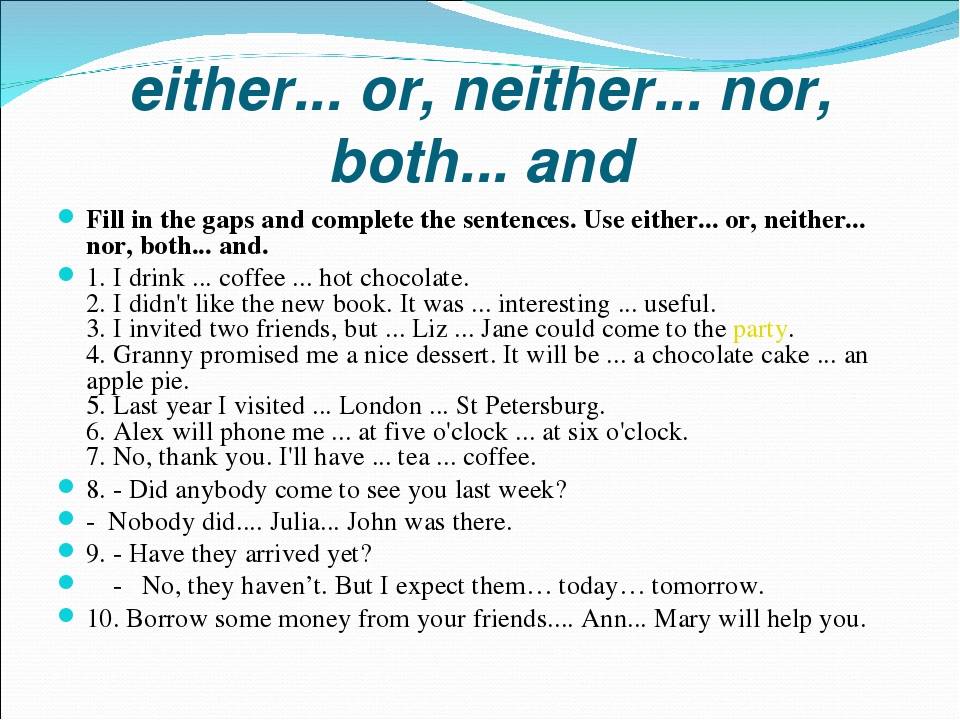
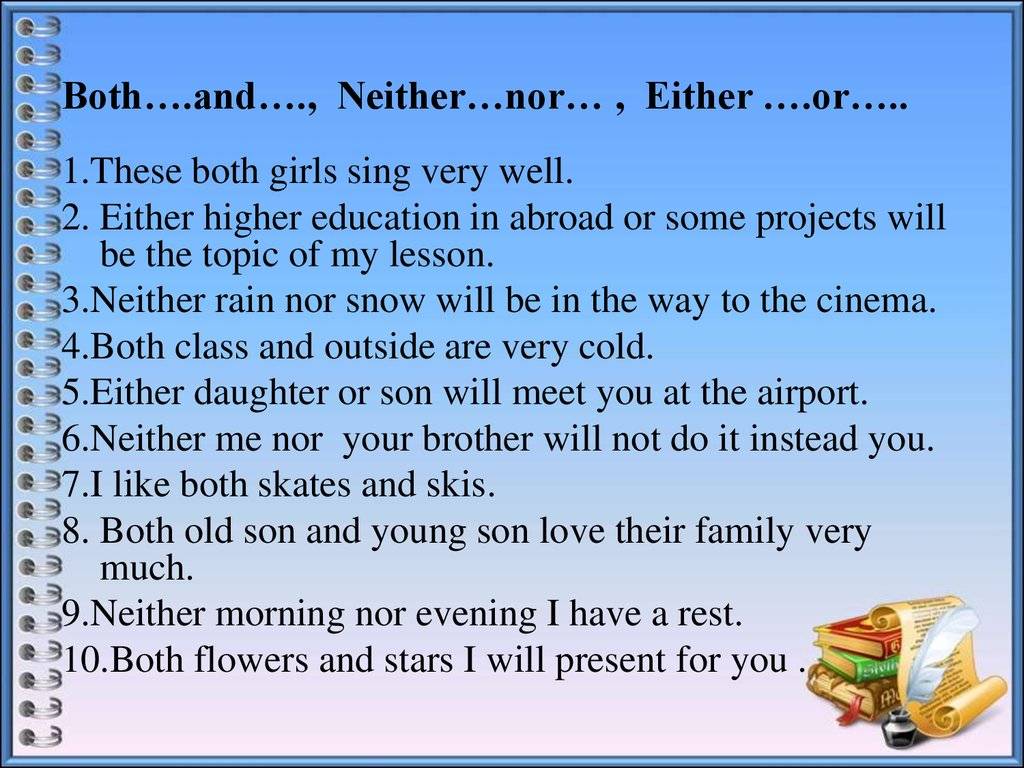
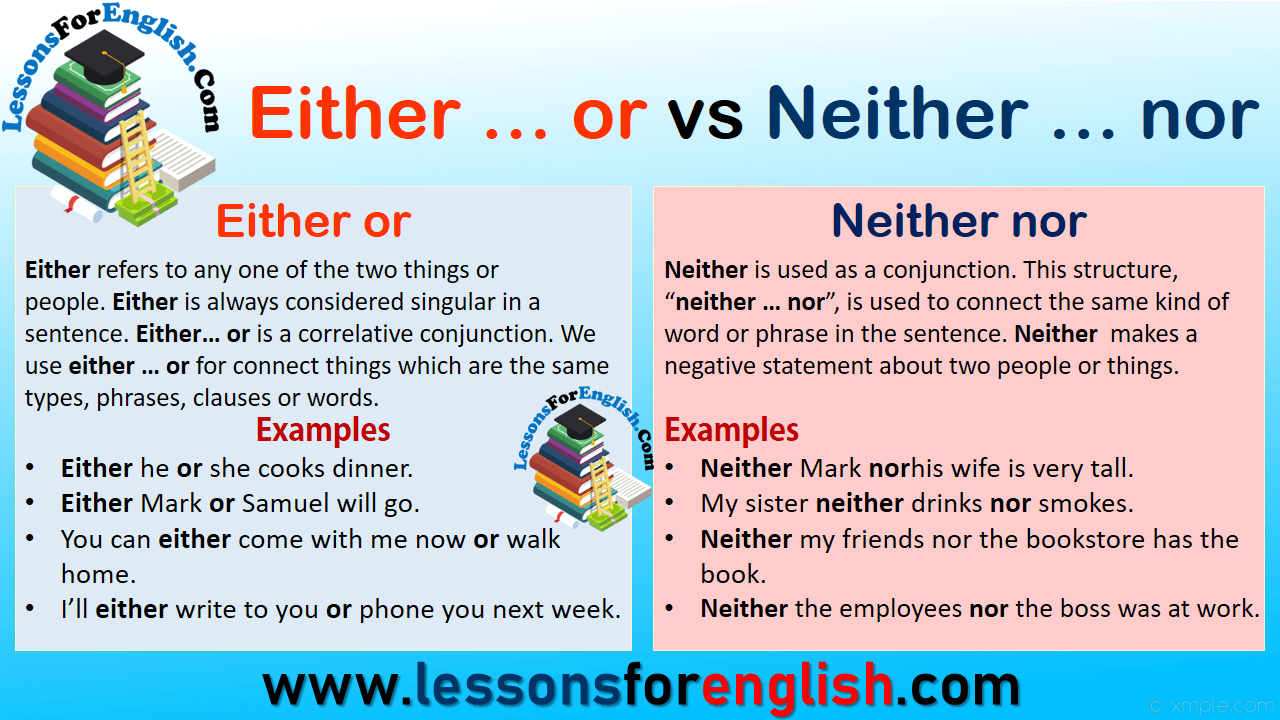
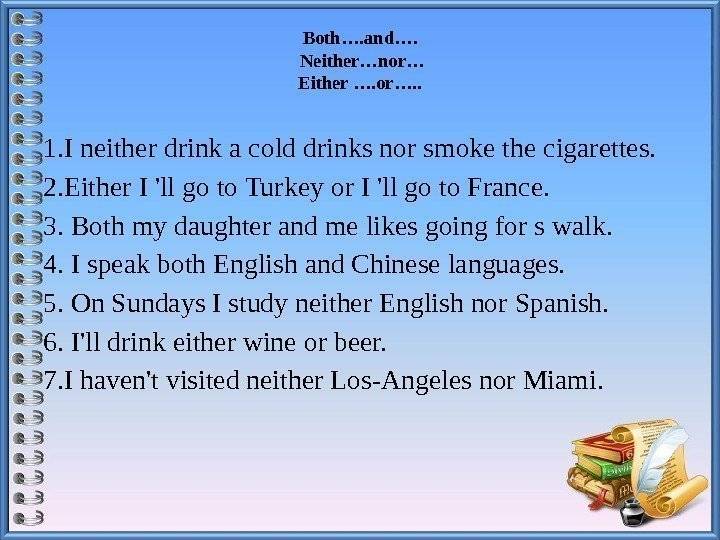
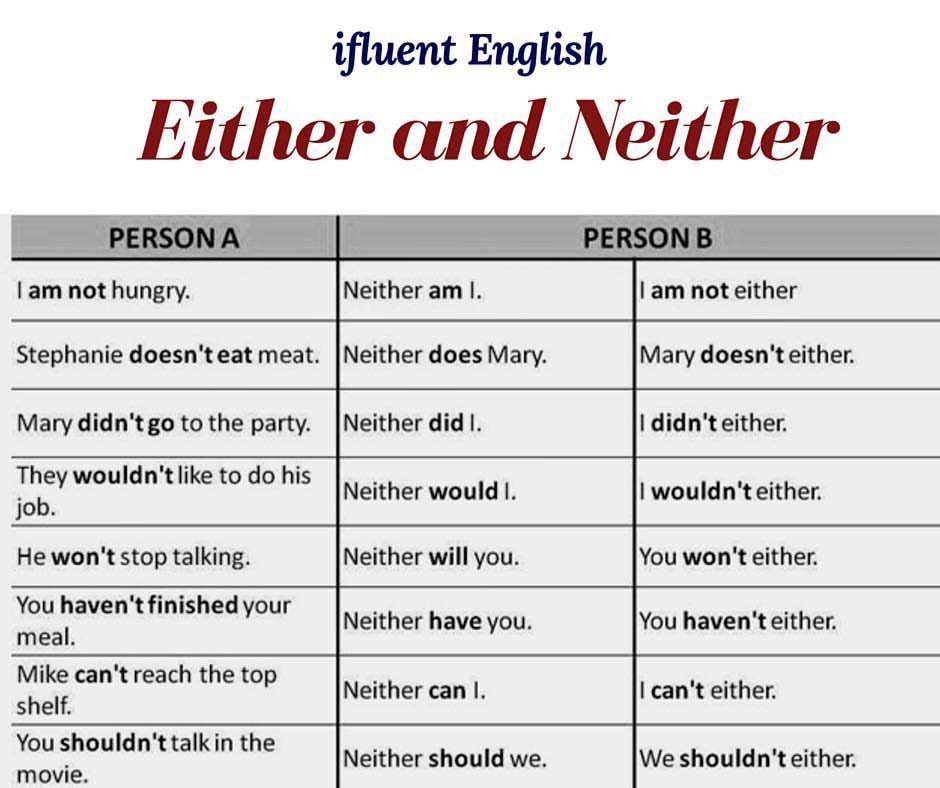
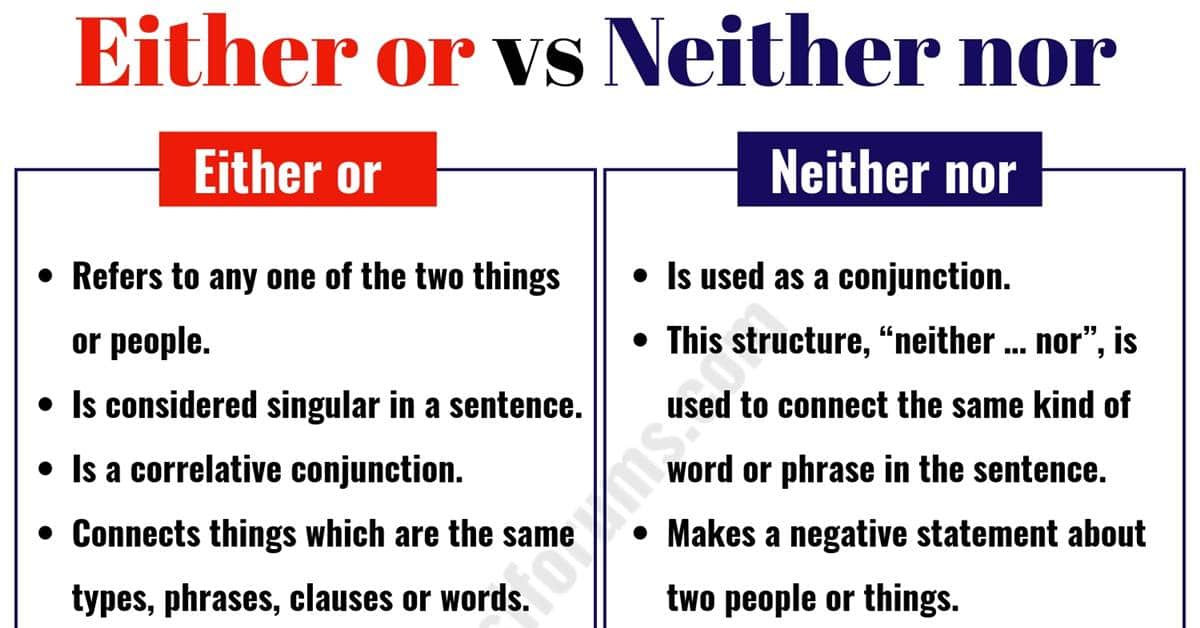
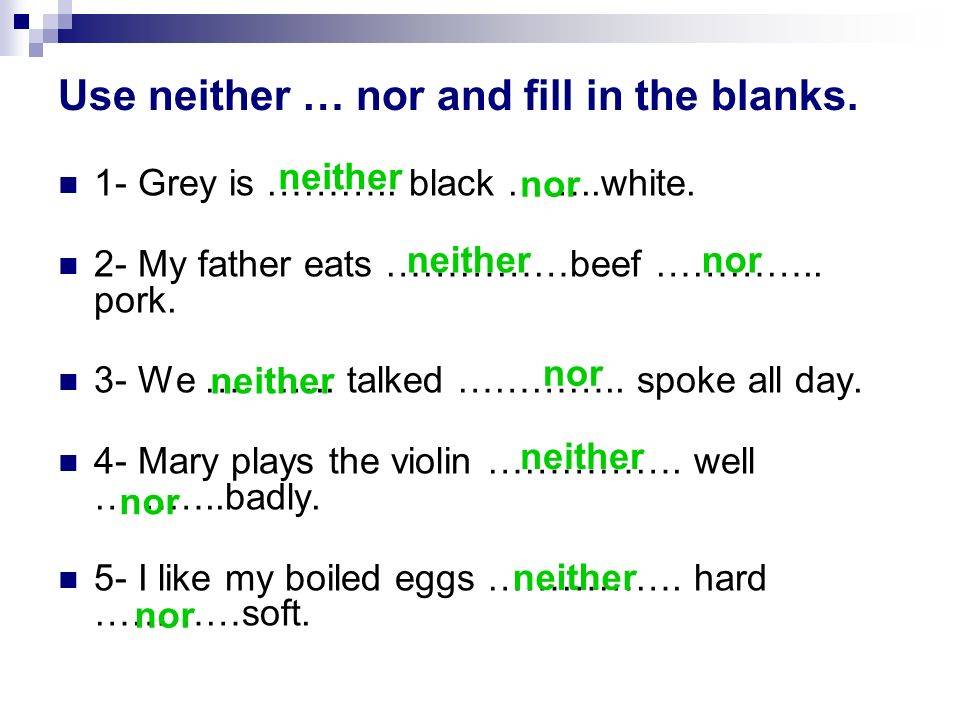
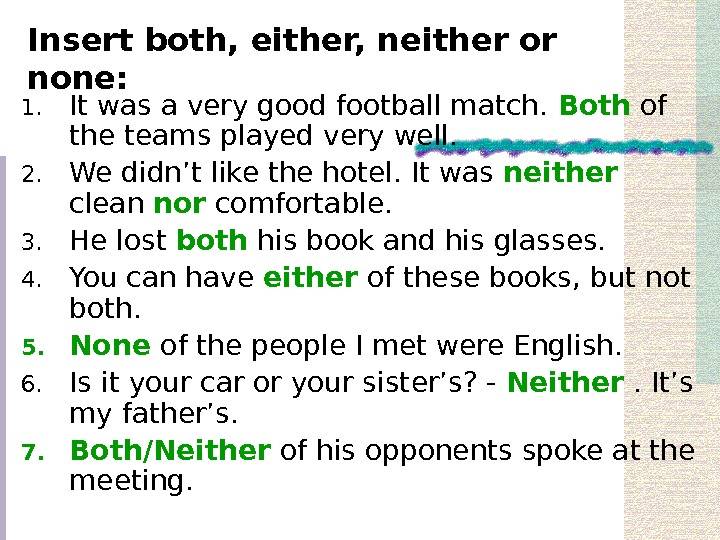
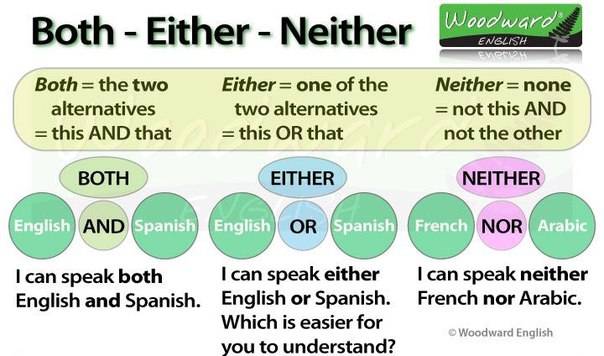
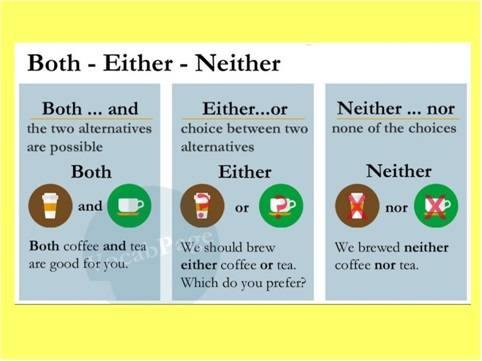
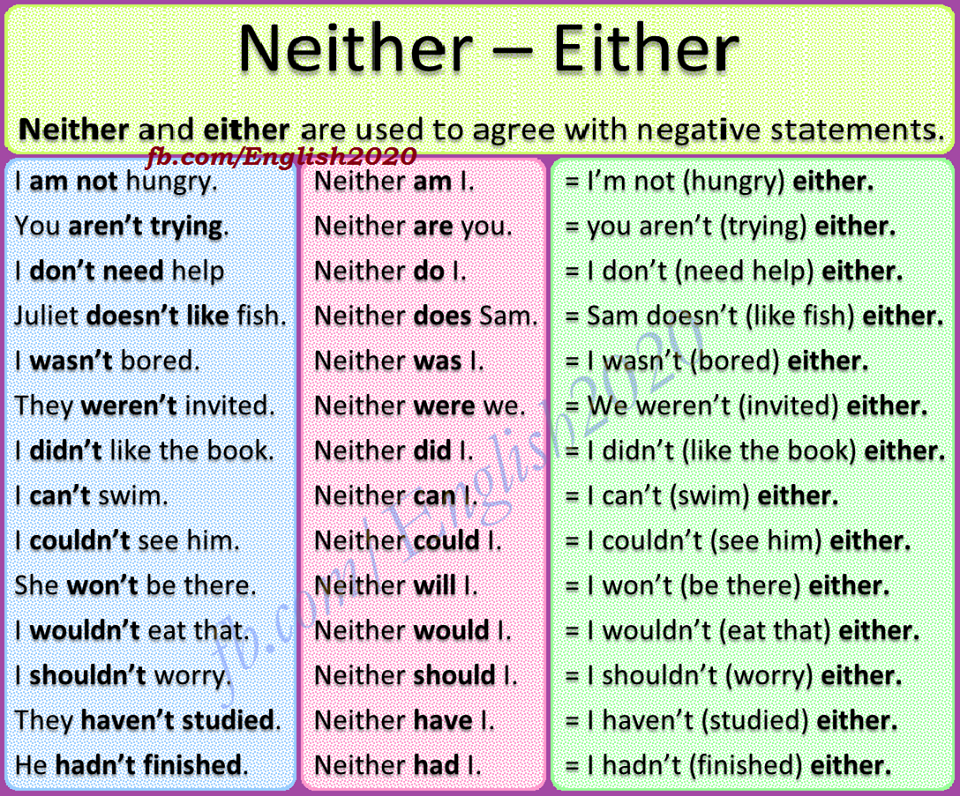
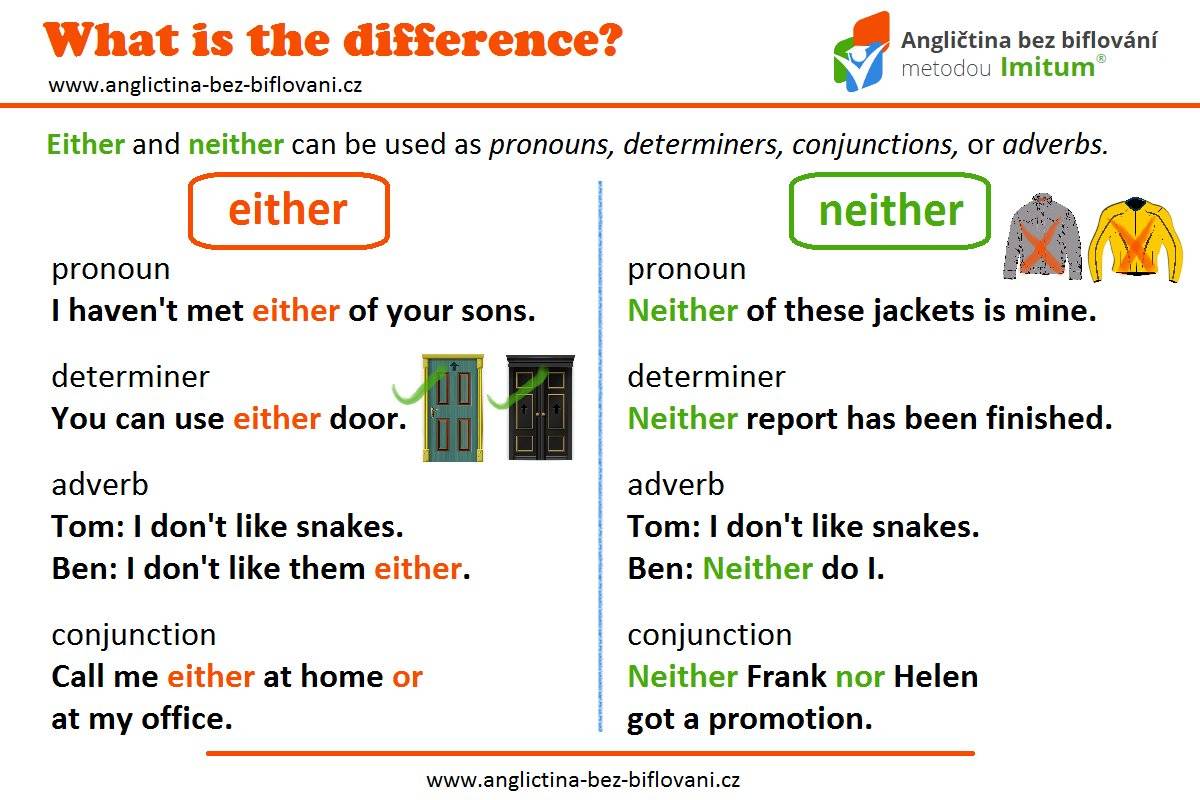
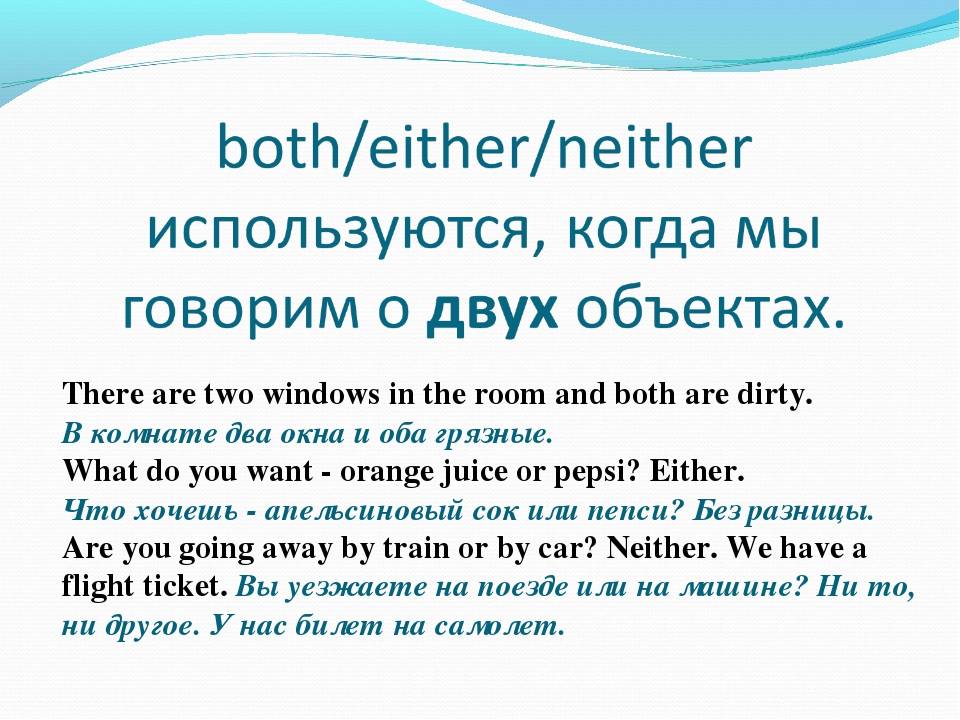
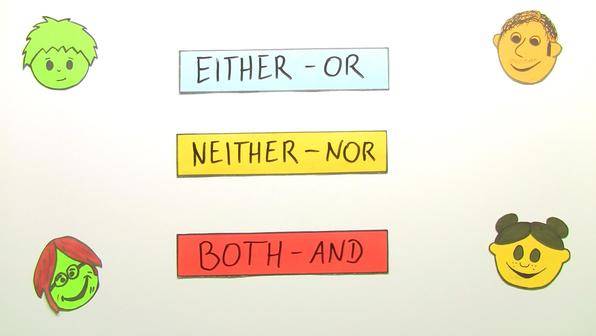
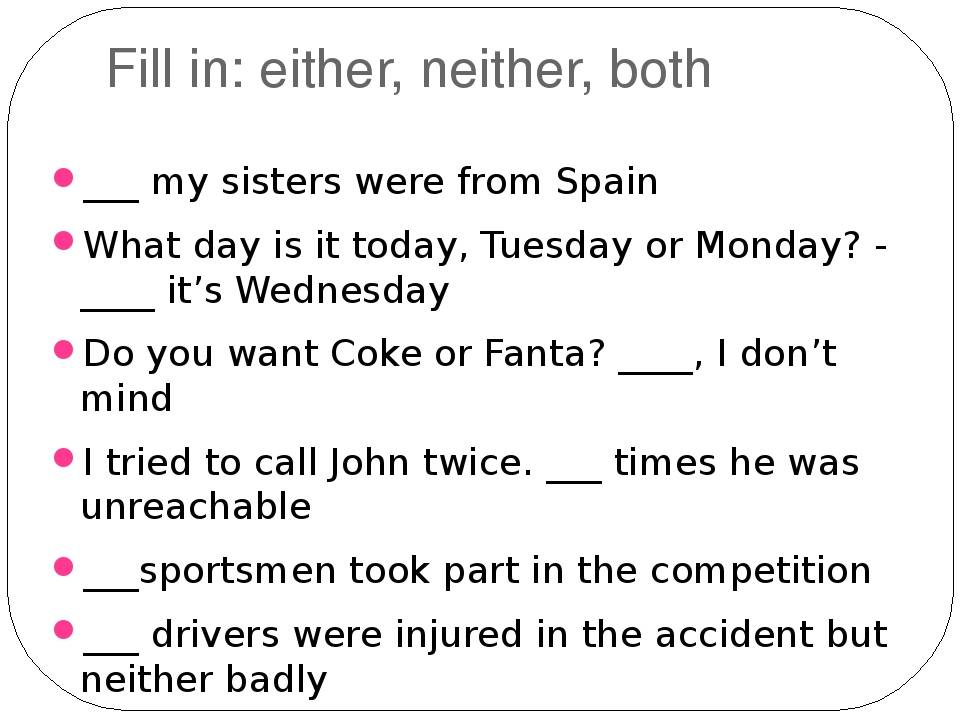
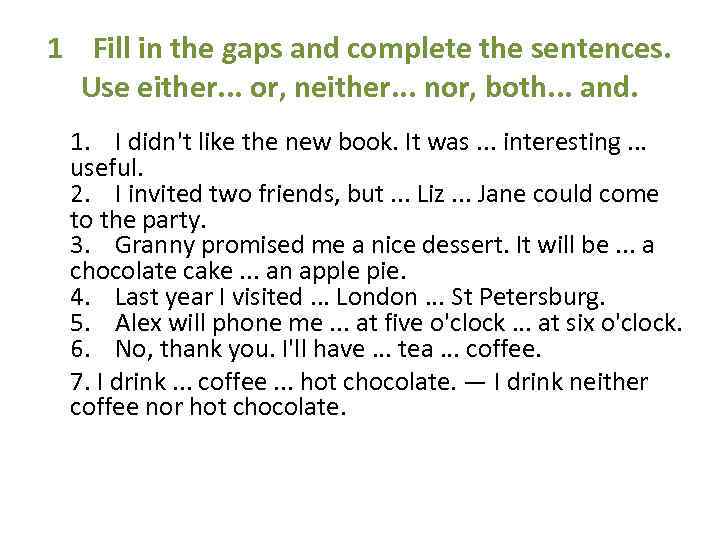
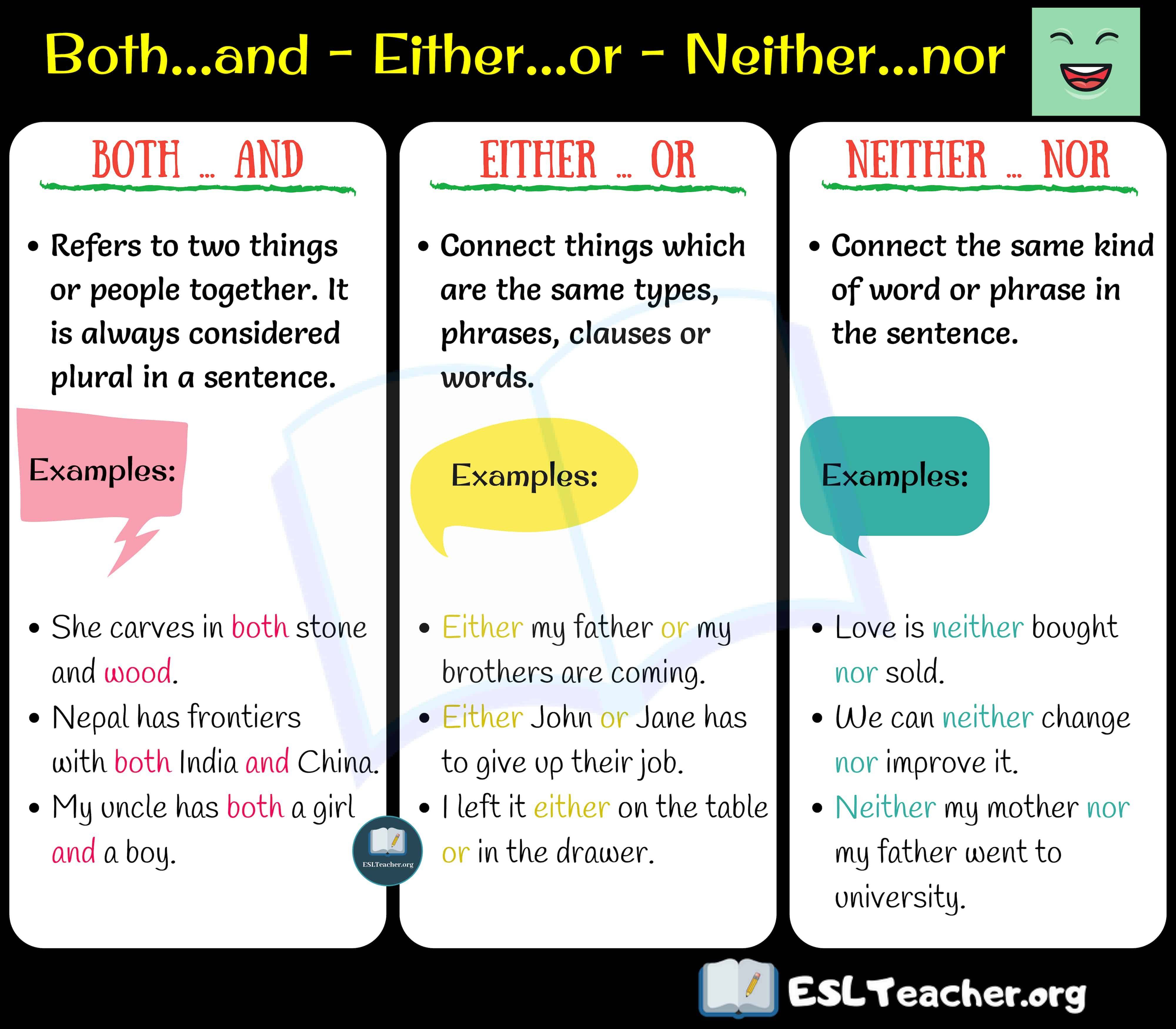
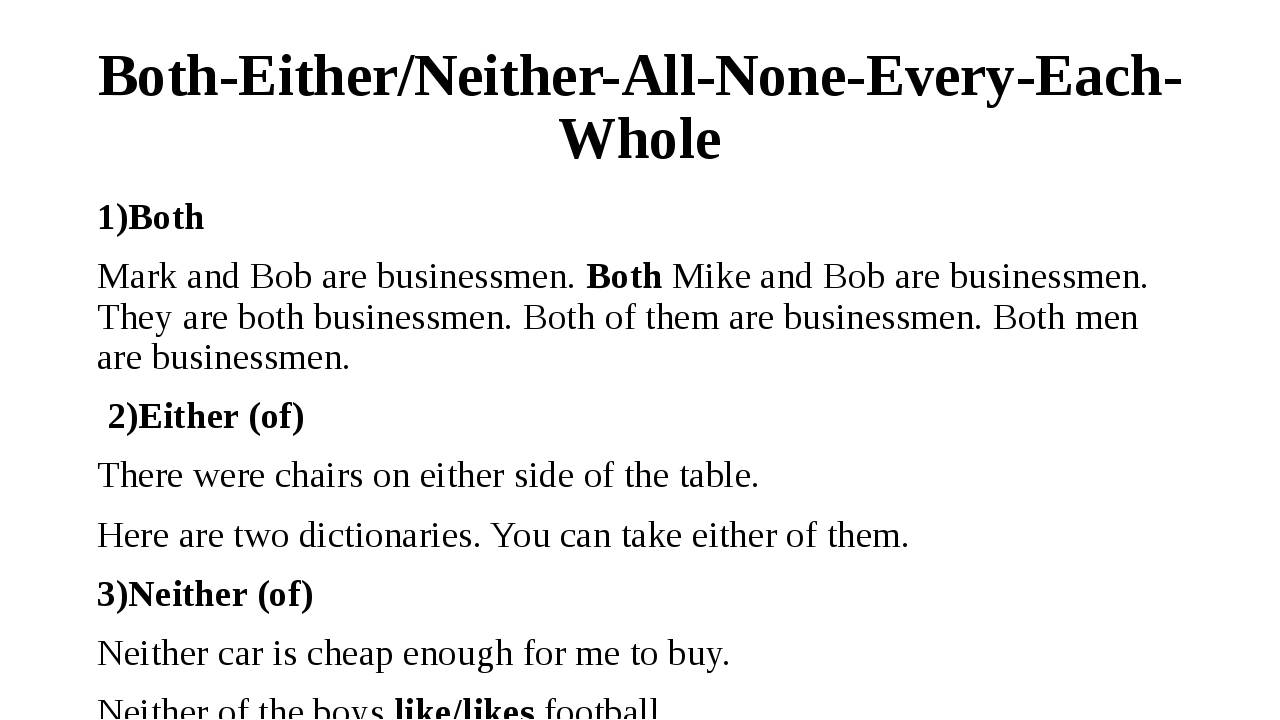
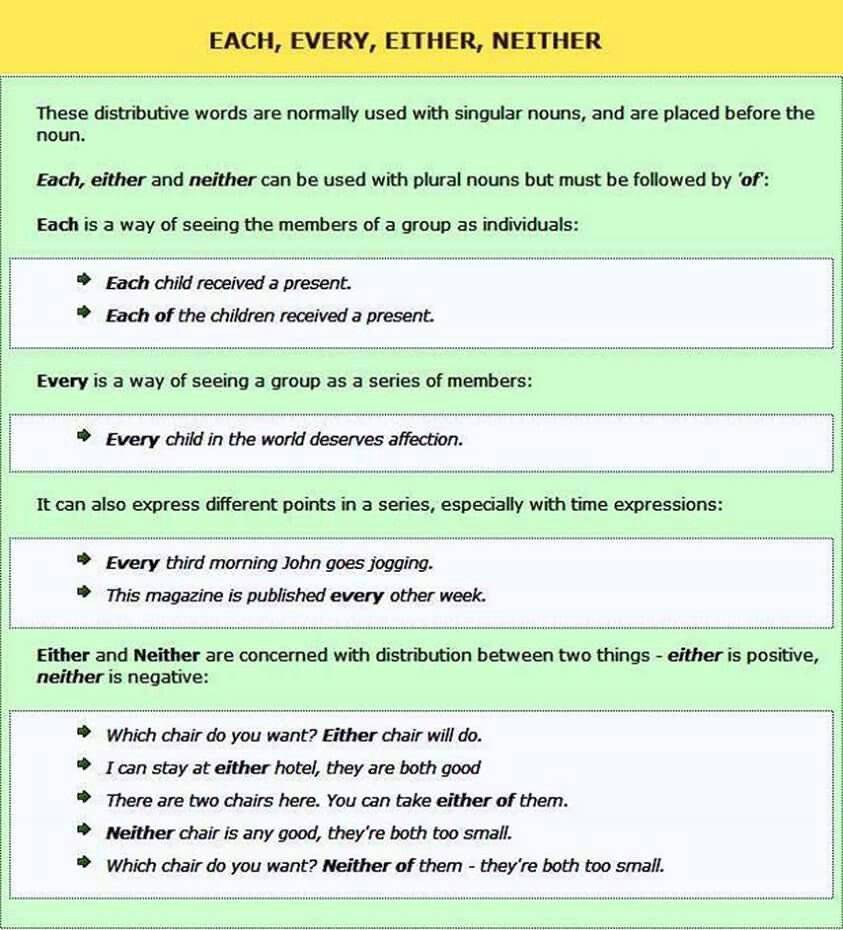
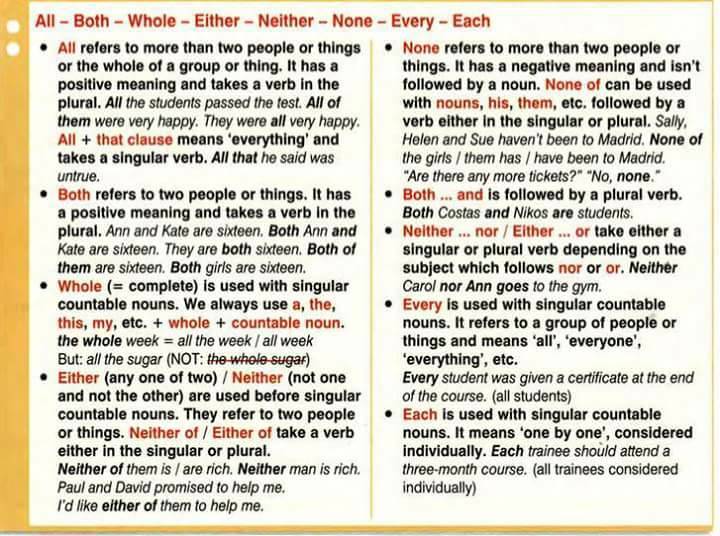
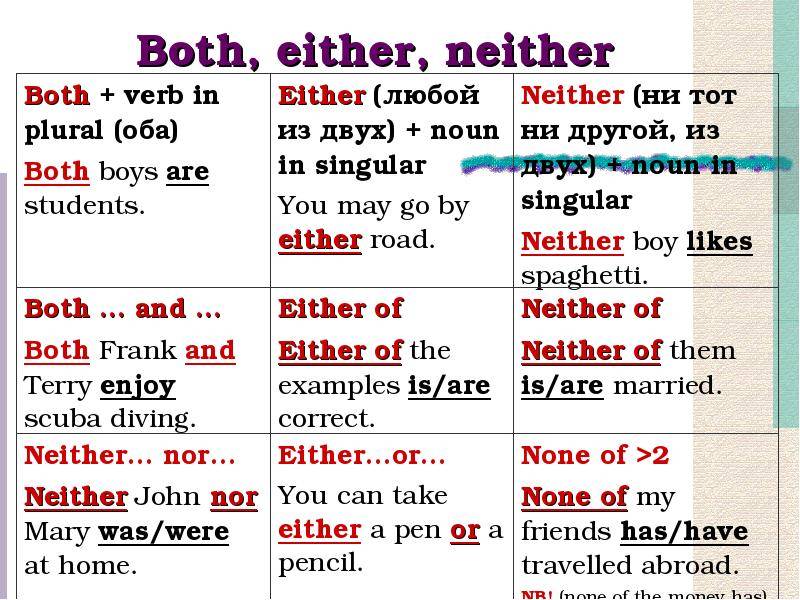
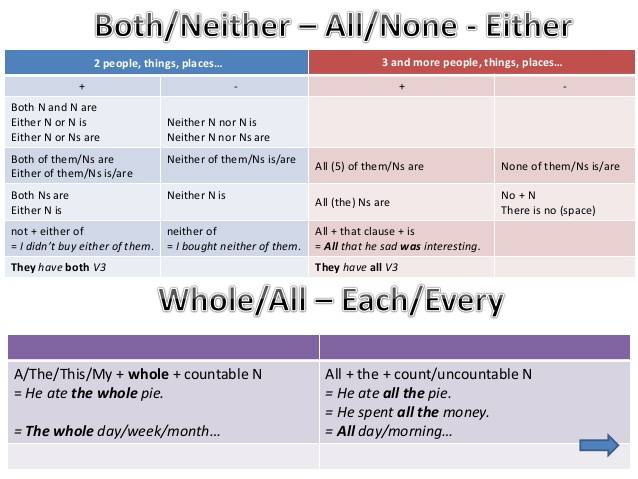
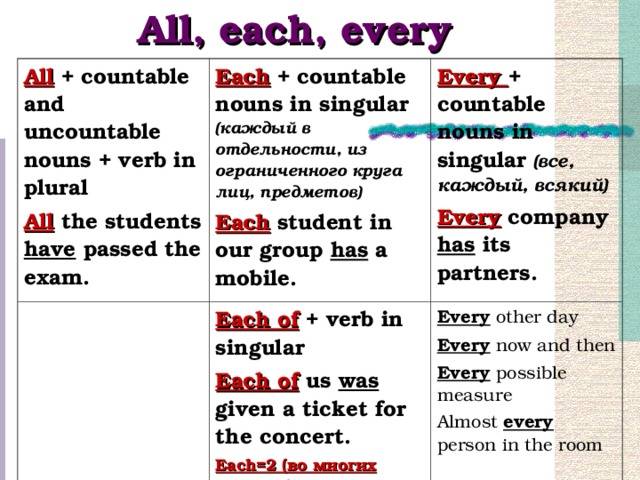
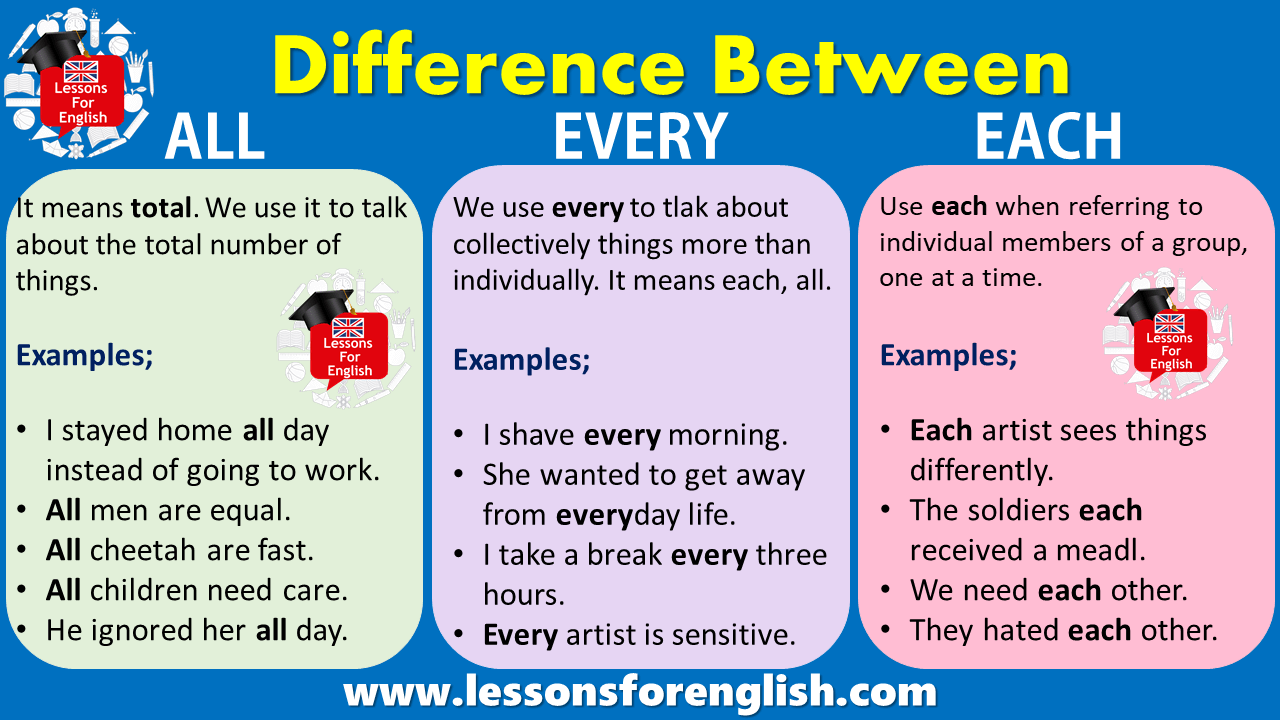
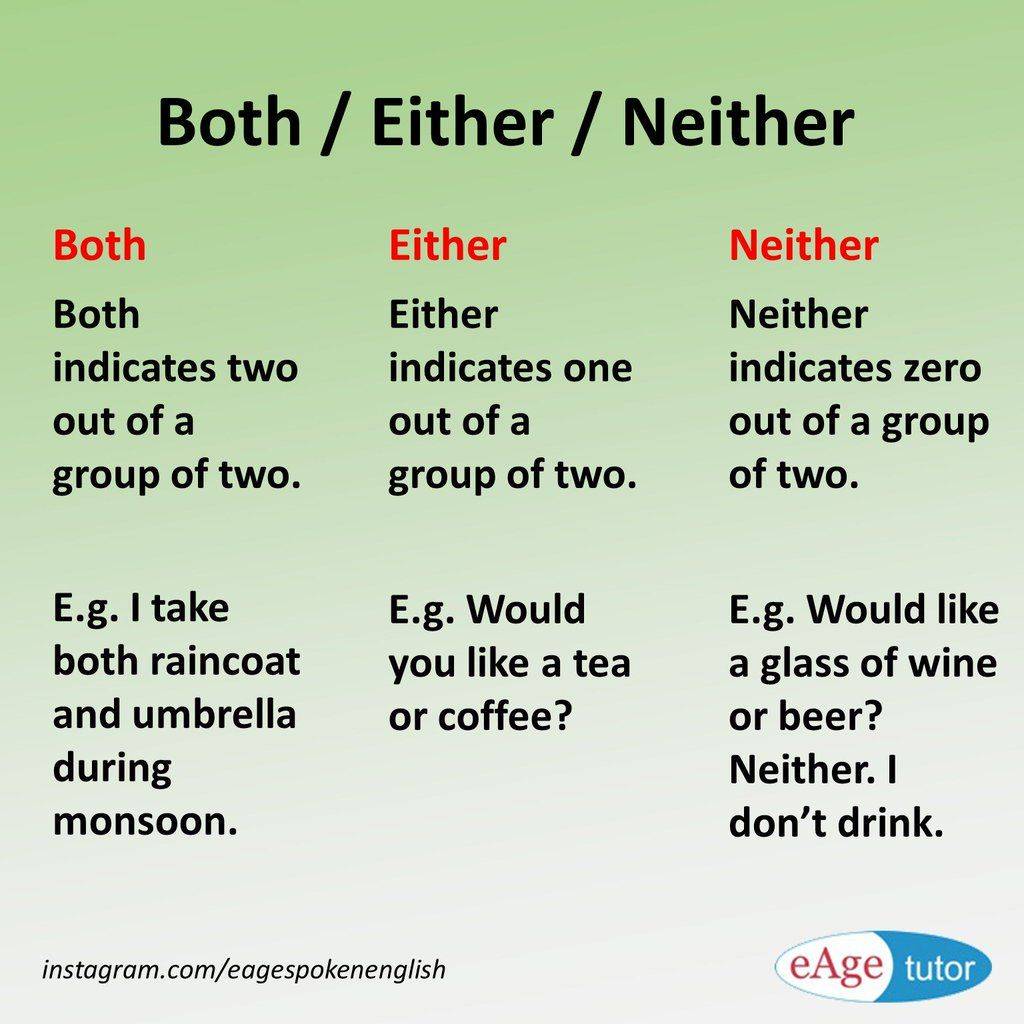
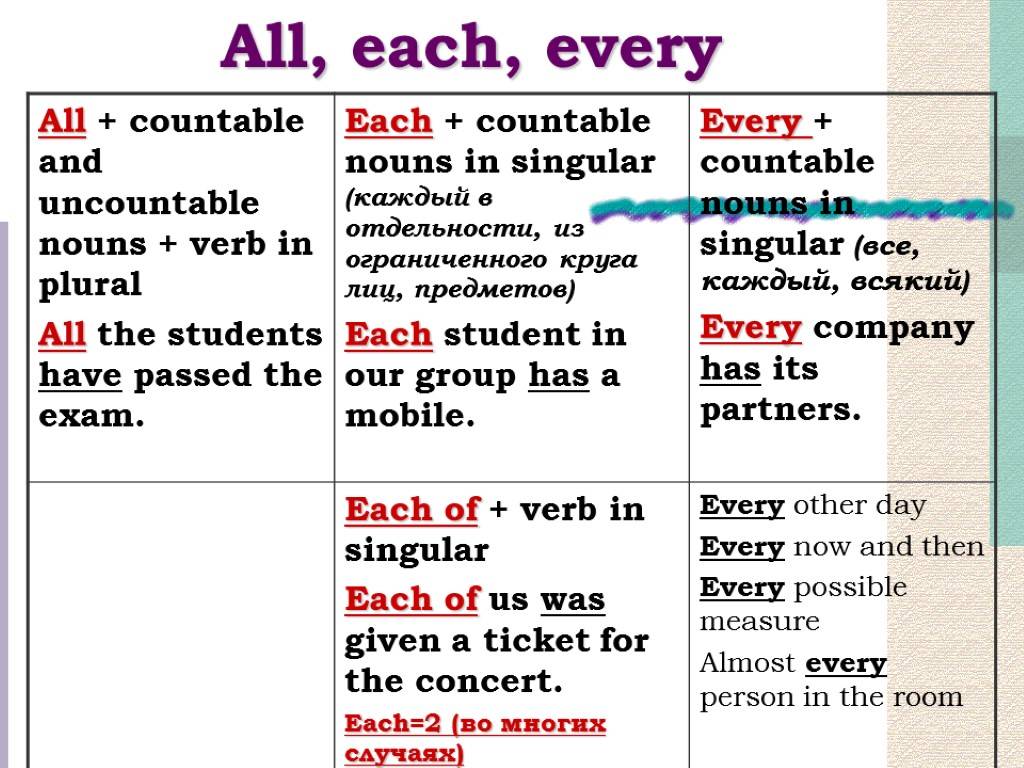
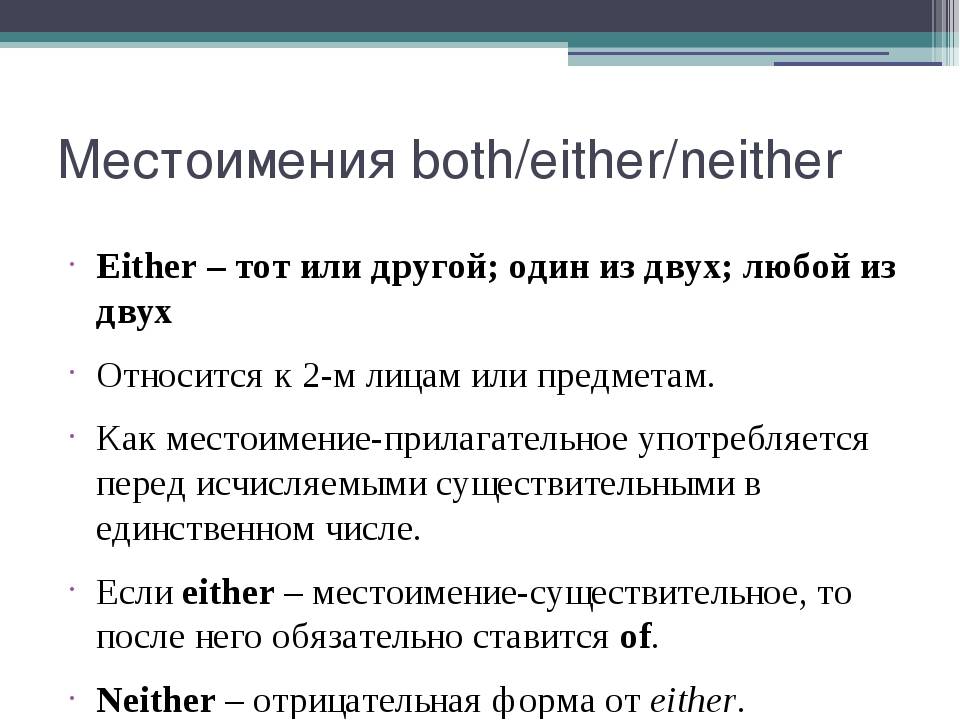
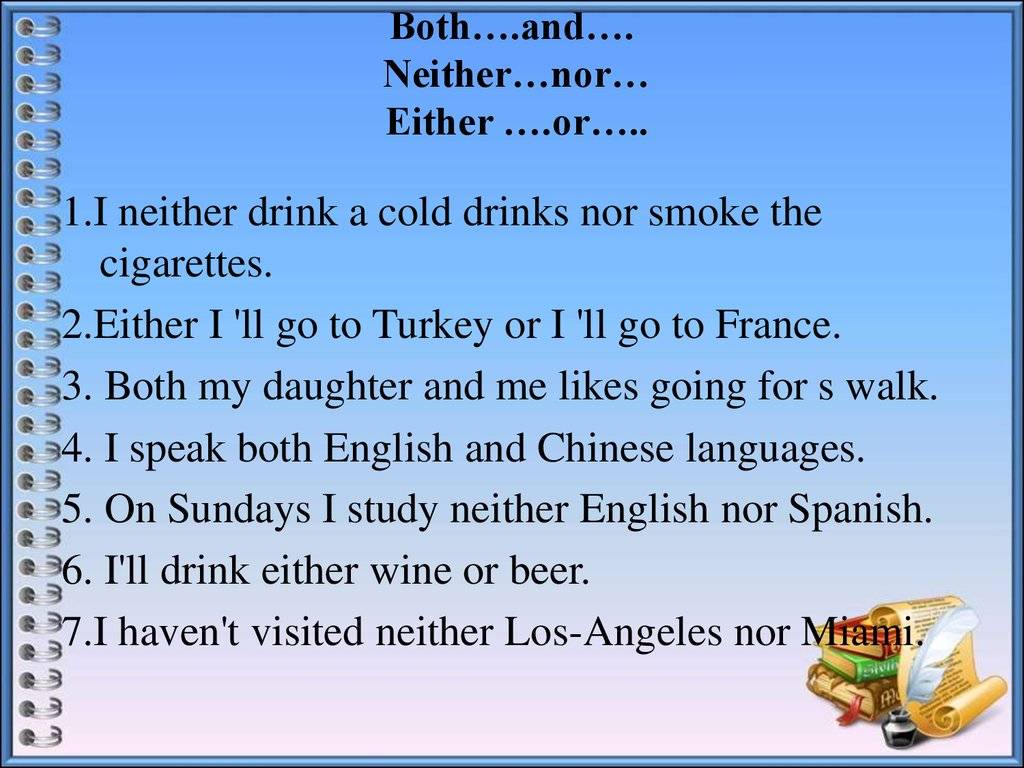
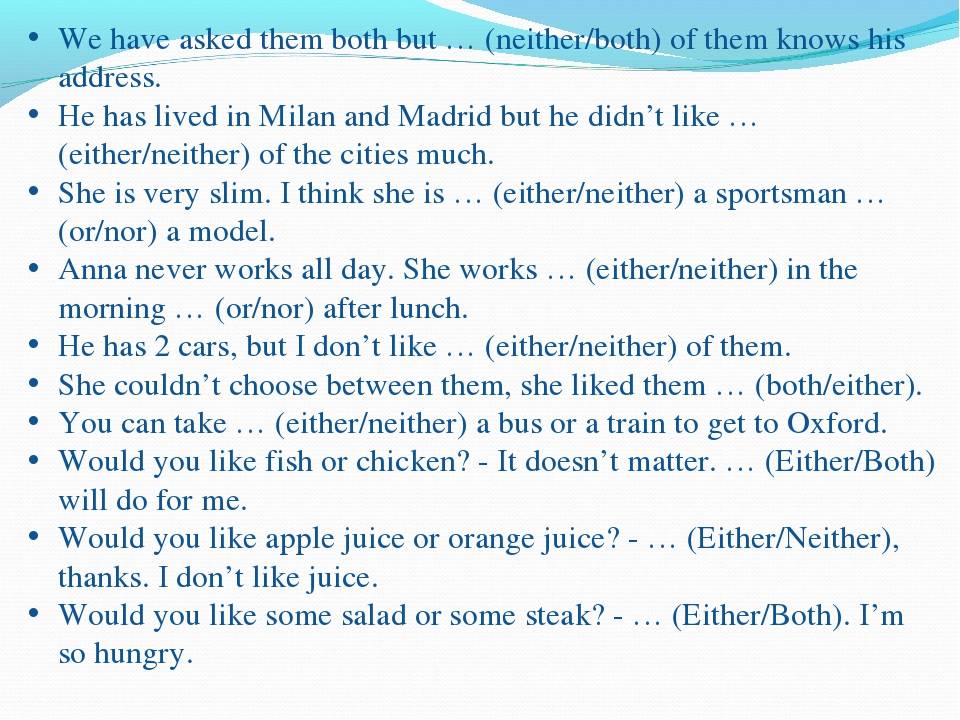
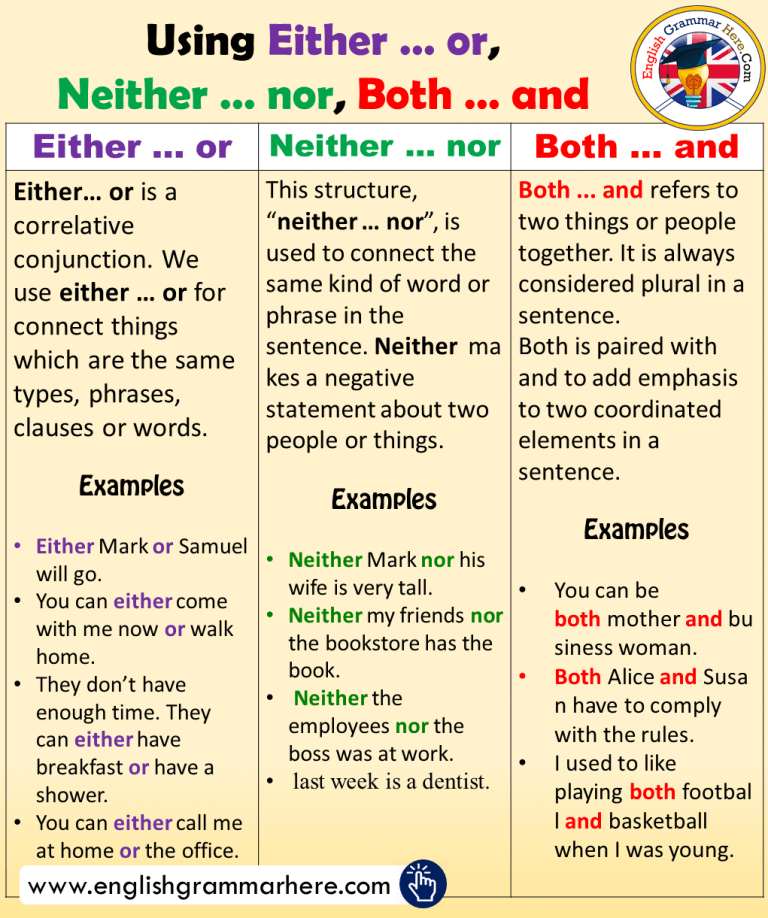
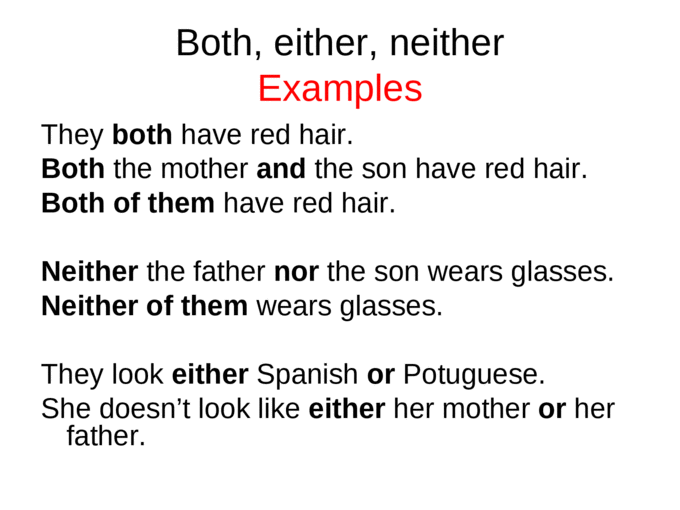
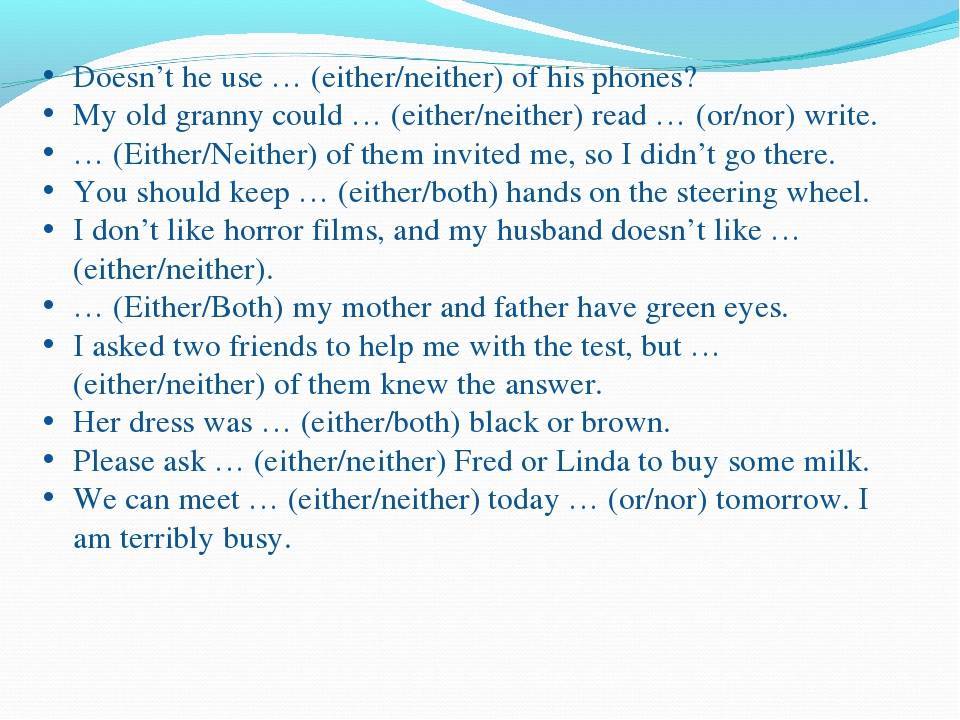
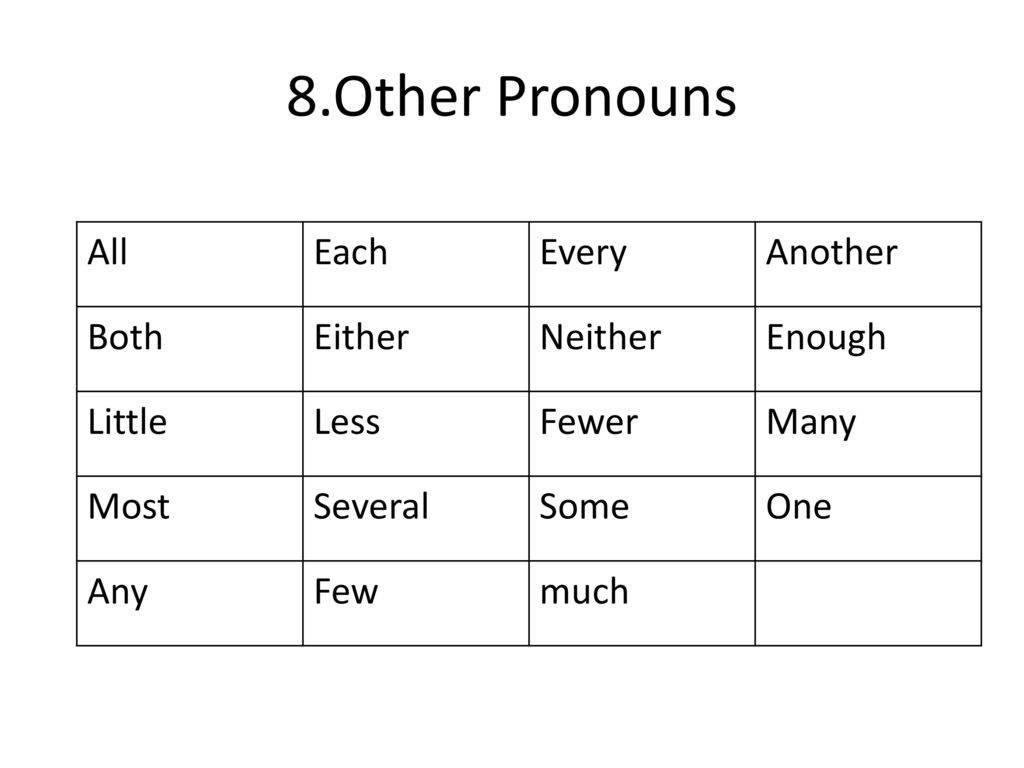
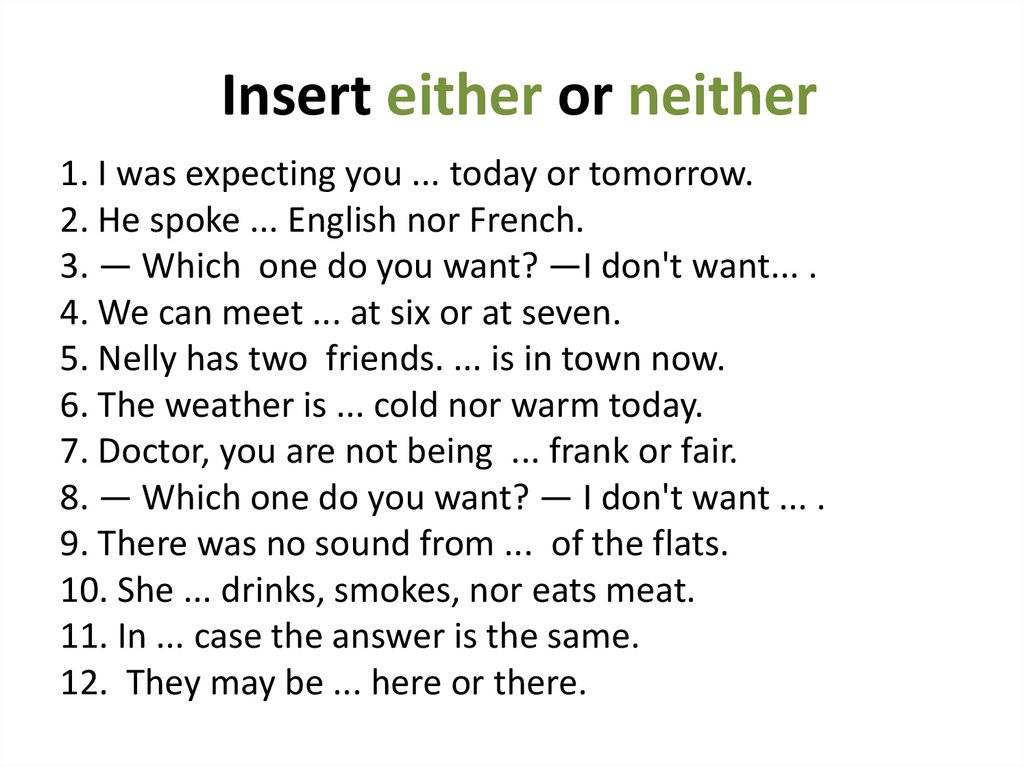
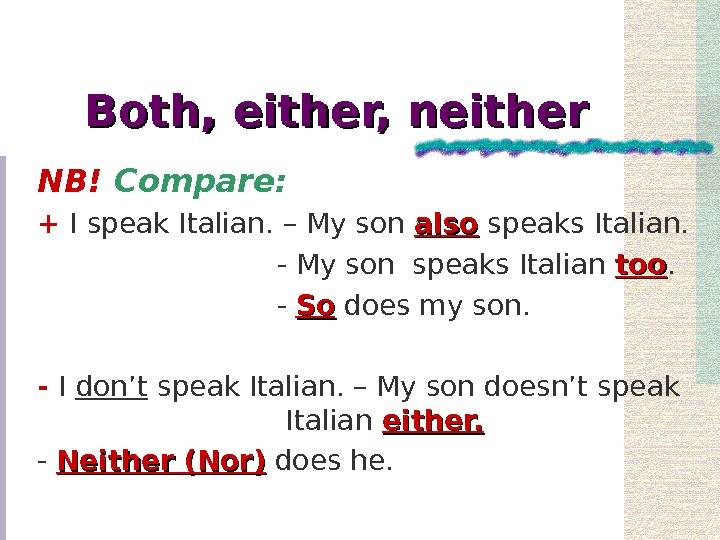
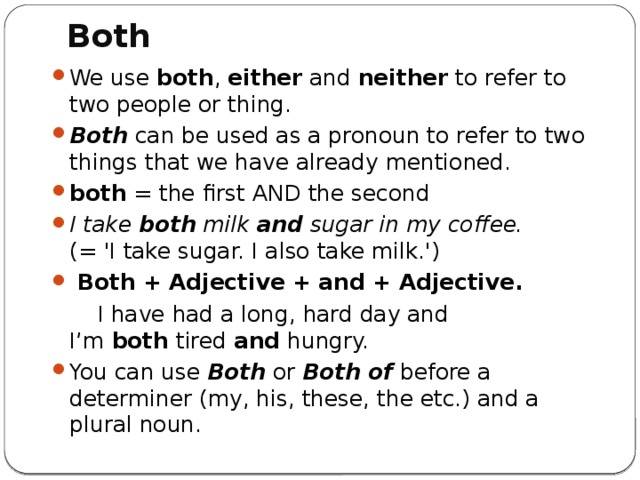
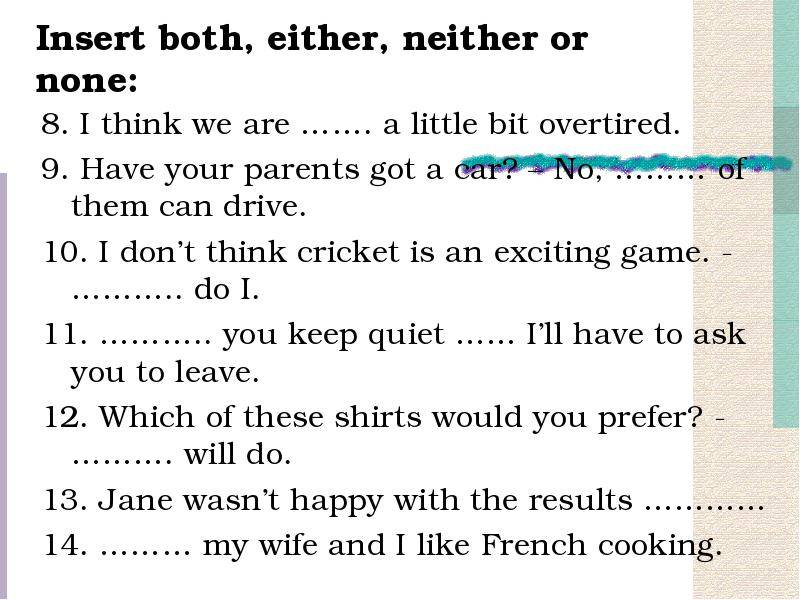
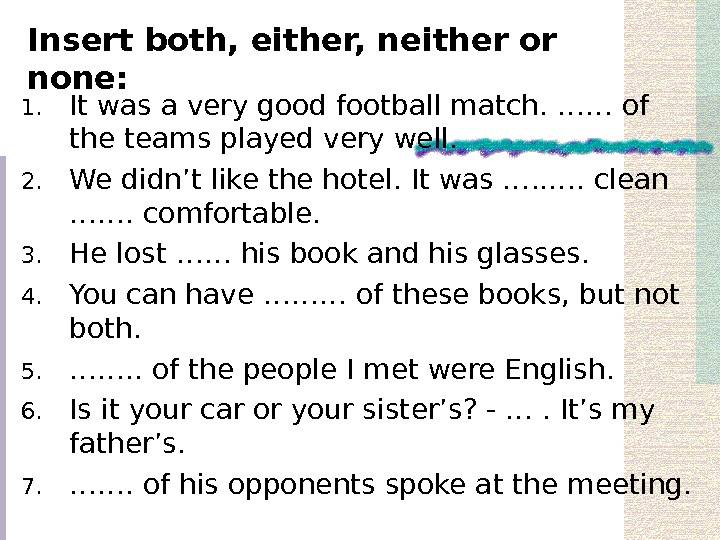
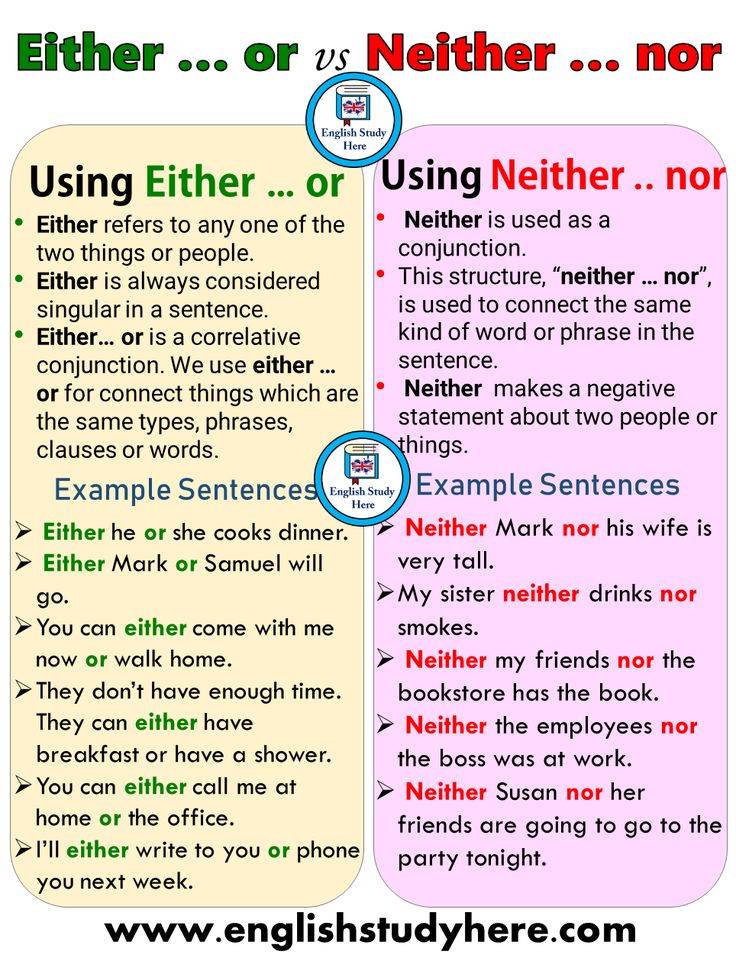
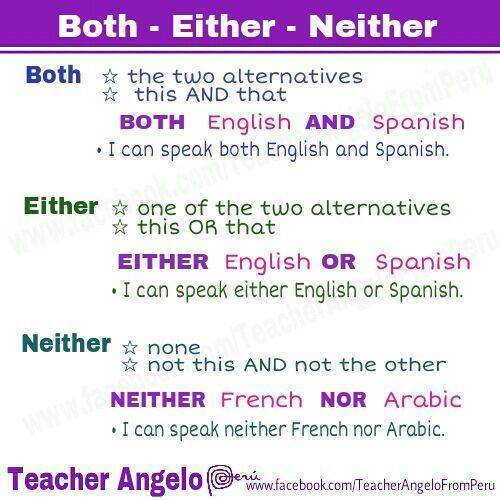
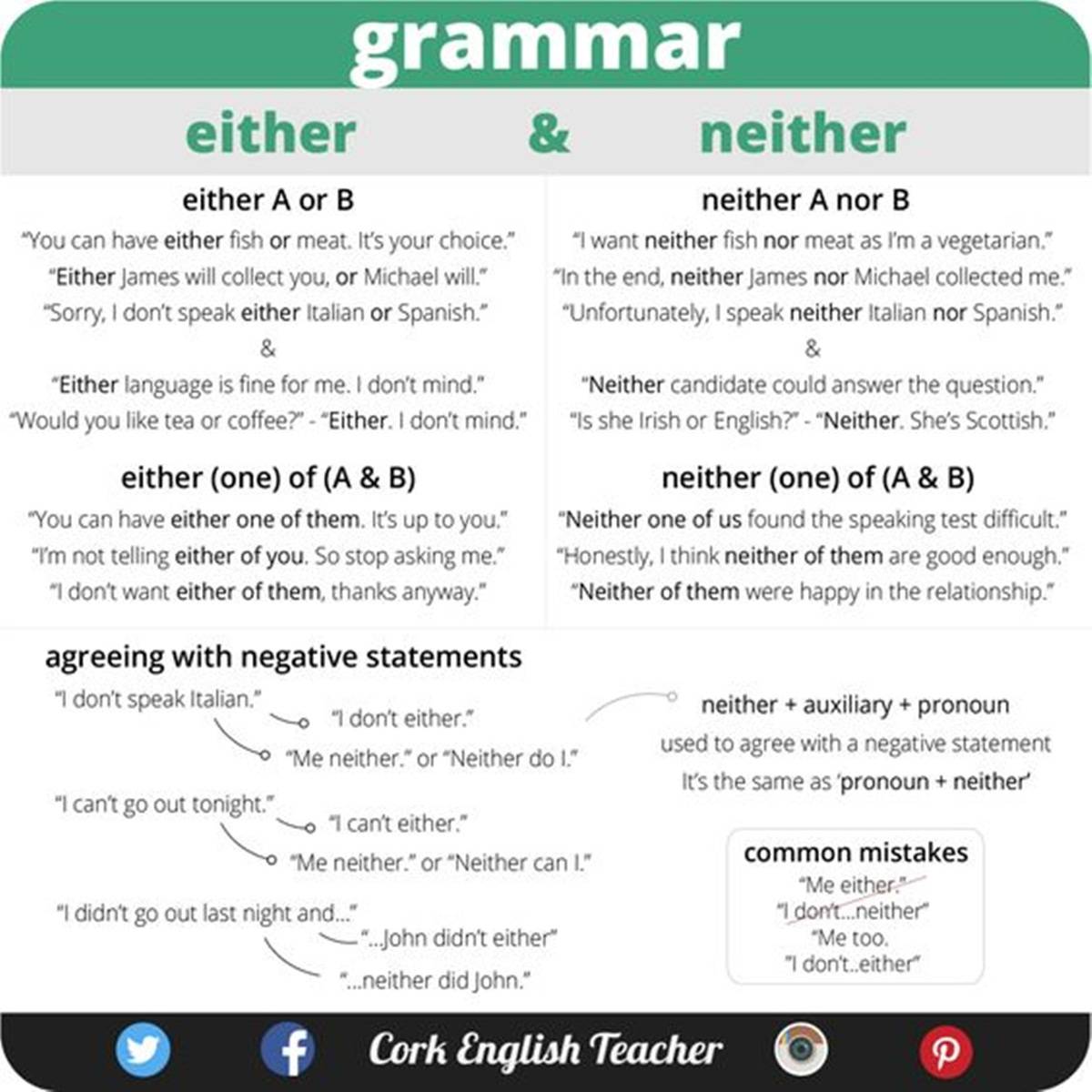
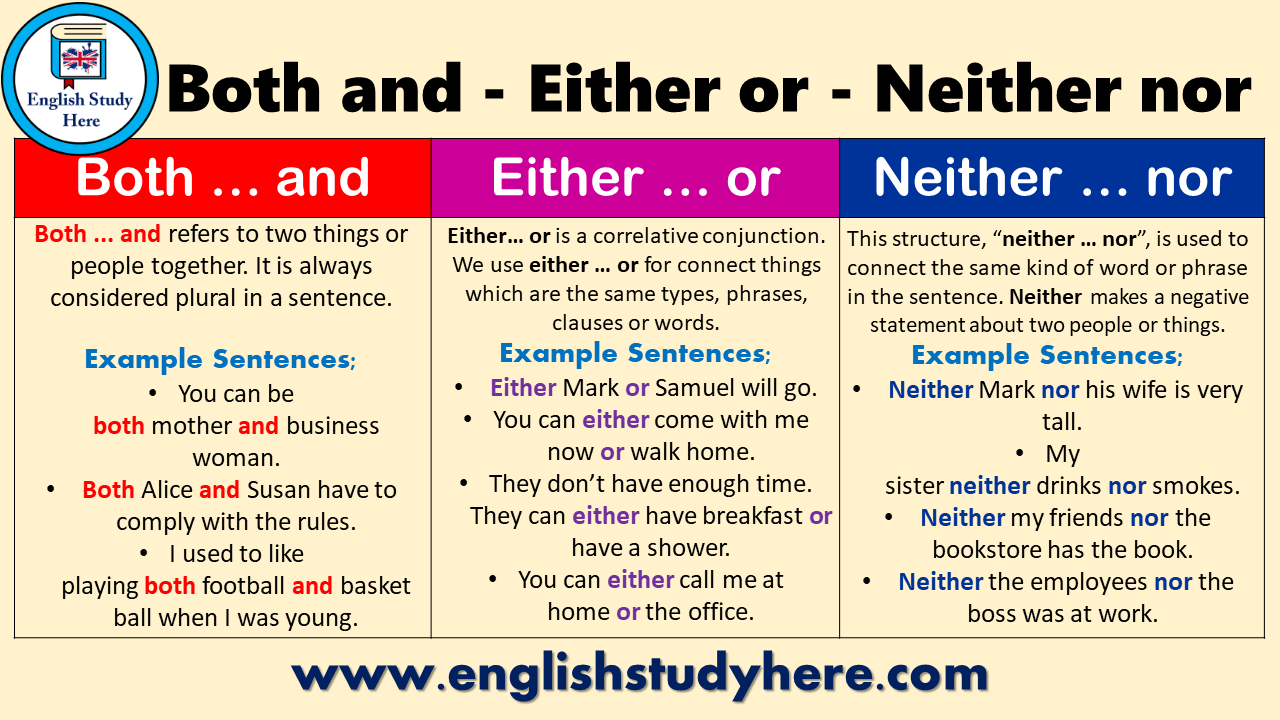
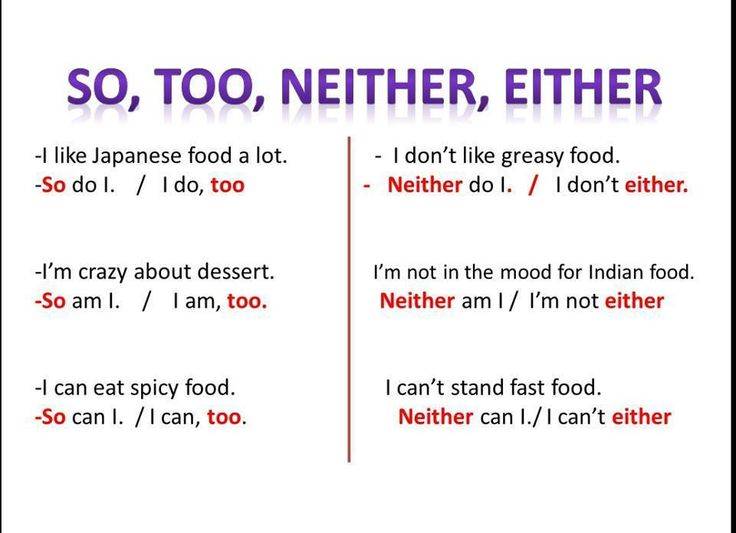
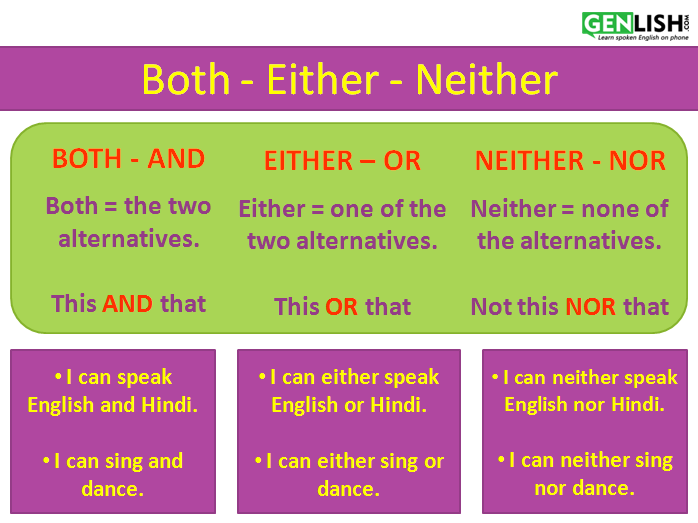
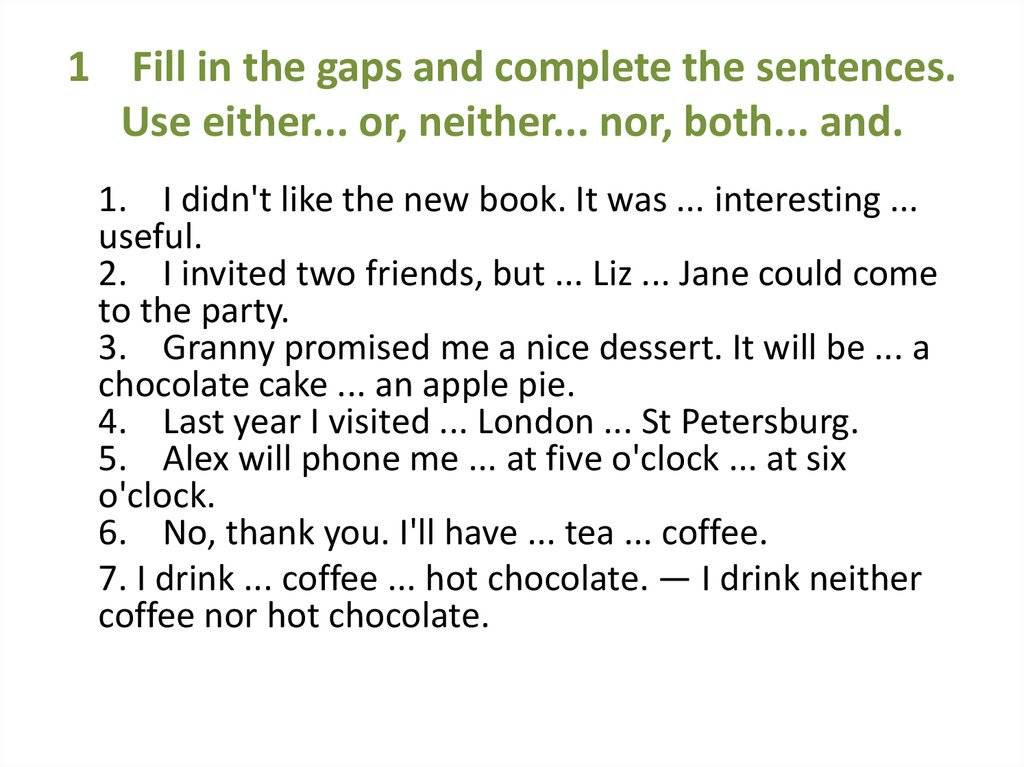
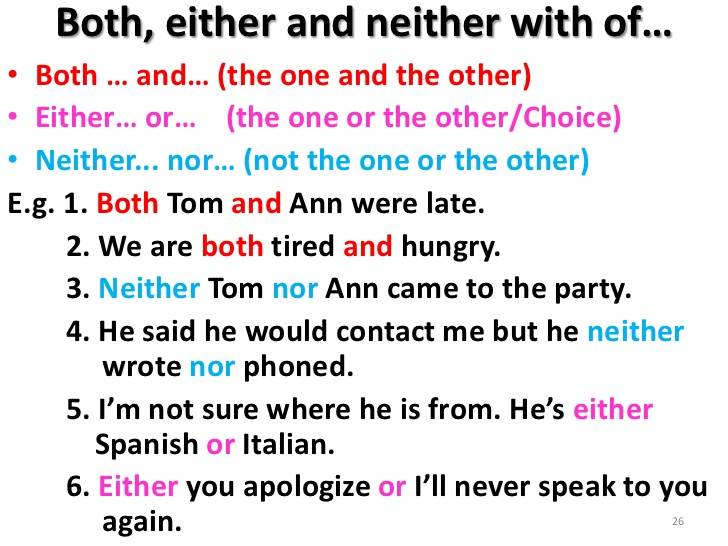
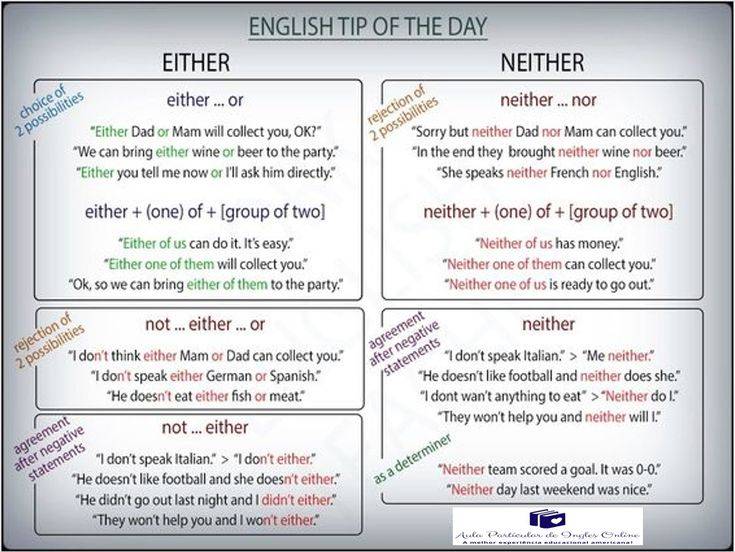
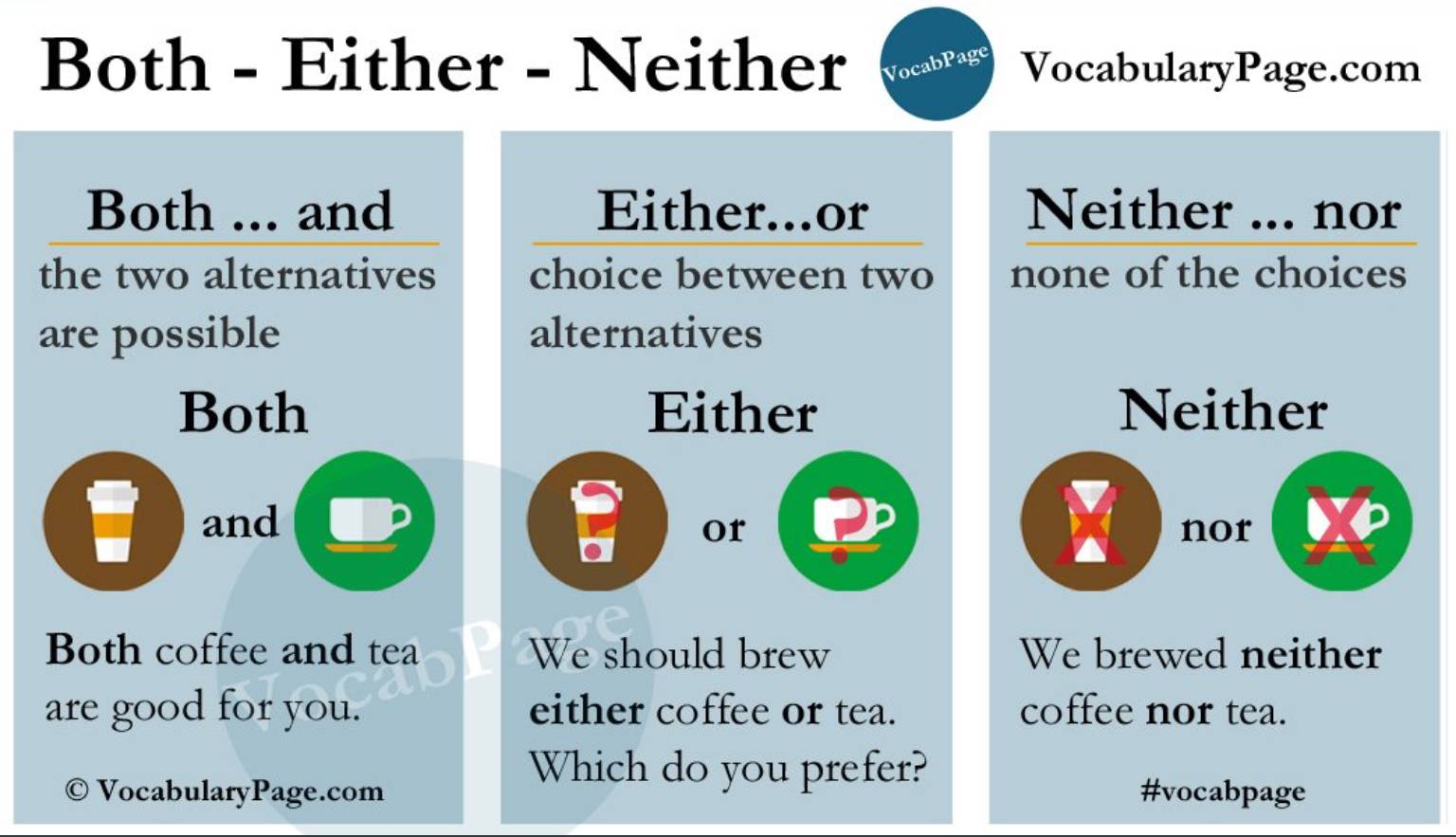

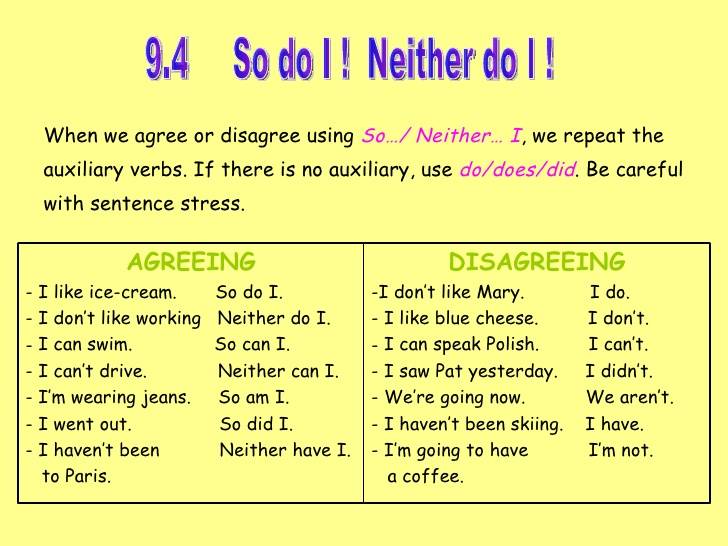

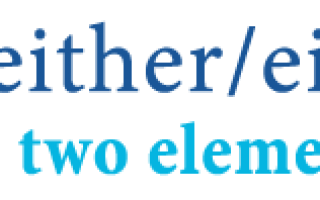



![Звуки [ ɪ, i:, e, ǝ ] в английском языке и их произношение](https://mulino58.ru/wp-content/cache/thumb/8f/0a6bd21ed56bb8f_150x95.jpg)